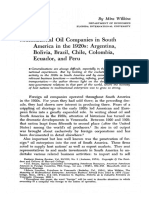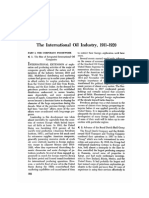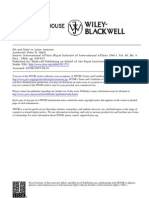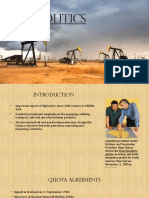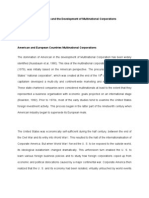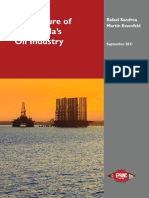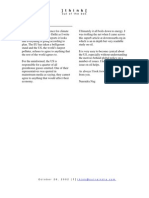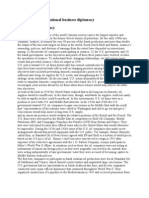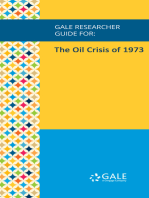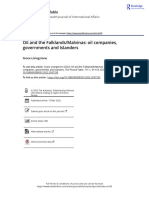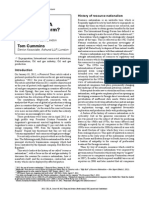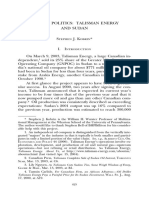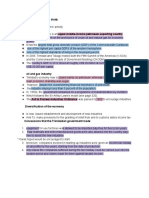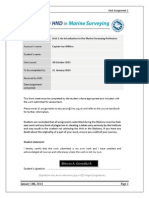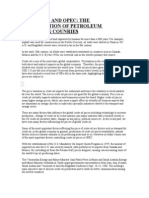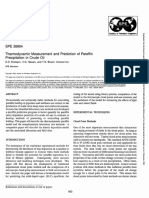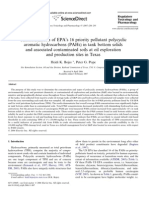Professional Documents
Culture Documents
Wilkins OilCompaniesSouthAmerica1920s 1974
Wilkins OilCompaniesSouthAmerica1920s 1974
Uploaded by
Alexandra BejaranoOriginal Description:
Copyright
Available Formats
Share this document
Did you find this document useful?
Is this content inappropriate?
Report this DocumentCopyright:
Available Formats
Wilkins OilCompaniesSouthAmerica1920s 1974
Wilkins OilCompaniesSouthAmerica1920s 1974
Uploaded by
Alexandra BejaranoCopyright:
Available Formats
Multinational Oil Companies in South America in the 1920s: Argentina, Bolivia, Brazil,
Chile, Colombia, Ecuador, and Peru
Author(s): Mira Wilkins
Source: The Business History Review , Autumn, 1974, Vol. 48, No. 3, Multinational
Enterprise (Autumn, 1974), pp. 414-446
Published by: The President and Fellows of Harvard College
Stable URL: https://www.jstor.org/stable/3112955
REFERENCES
Linked references are available on JSTOR for this article:
https://www.jstor.org/stable/3112955?seq=1&cid=pdf-
reference#references_tab_contents
You may need to log in to JSTOR to access the linked references.
JSTOR is a not-for-profit service that helps scholars, researchers, and students discover, use, and build upon a wide
range of content in a trusted digital archive. We use information technology and tools to increase productivity and
facilitate new forms of scholarship. For more information about JSTOR, please contact support@jstor.org.
Your use of the JSTOR archive indicates your acceptance of the Terms & Conditions of Use, available at
https://about.jstor.org/terms
is collaborating with JSTOR to digitize, preserve and extend access to The Business History
Review
This content downloaded from
168.176.5.118 on Mon, 31 Jan 2022 19:32:40 UTC
All use subject to https://about.jstor.org/terms
By Mira Wilkins
DEPARTMENT OF ECONOMICS
FLORIDA INTERNATIONAL UNIVERSITY
Multinational Oil Companies in Sou
America in the 1920s: Argentina
Bolivia, Brazil, Chile, Colombia,
Ecuador, and Peru
V Generalizations are always difficult, especially in the cont
national experiences. But by looking at the evolution of
activity in the 1920s in South America and by examining
relevant business functions - marketing, refining, production,
transportation - the author throws light on the developm
ness-government relations in that part -of the world, where
of host nations to multinational enterprises was to grow so s
Foreign oil companies operated throughout Sout
in the 1920s. For years they had sold there; in the pre
ade, they had shown new interest in producing there.
crippling oil shortage in the early 1920s led American
pean firms into a greatly expanded role. In writing ab
South America in the 1920s, attention of historians h
the dramatic developments in Venezuela. Between 1920
that nation leapt from fifteenth to second place (afte
States) among the world's oil producers.' Its rise i
was brought about exclusively by foreign corporat
been documented in detail elsewhere.2
Also important but less well known was the penetration of for-
eign 3 oil enterprises into the rest of South America. These firms
acted to supply host nations' as well as export markets. They sent
representatives to and made investments in South America to un-
dertake various related business activities: to import and to sell
Business History Review, Vol. XLVIII, No. 3 (Autumn, 1974). Copyright ? The Presi-
dent and Fellows of Harvard College.
1 U.S. Senate, Special Committee Investigating Petroleum Resources, American Petroleum
Interests in Foreign Countries, 79th Cong., 1st sess. (1945), 354-355. Henceforth cited as
Petroleum Hearings.
2Edwin Lieuwen, Petroleum in Venezuela (Berkeley, Cal., 1954); Mira Wilkins, The
Maturing of Multinational Enterprise: American Business Abroad from 1914 to 1970 (Cam-
bridge, Mass., 1974), 114-116; Frederico G. Baptista, Historia de la Industria Petrolera en
Venezuela (Caracas, 1961).
8 Throughout this paper, the word "foreign" will be used to describe situations in which
ownership of a company was foreign to the nation of operation.
This content downloaded from
168.176.5.118 on Mon, 31 Jan 2022 19:32:40 UTC
All use subject to https://about.jstor.org/terms
imported and locally-produced petroleum products, to refine im-
ported crude oil for sale in the host nation, to refine locally-pro-
duced crude oil for host-nation sale and for export, to produce
crude oil both for host-nation markets and for export, to explore
for new oil resources, and to transport petroleum and petroleum
products.
As the foreign firms took the initiative and invested, South Amer-
ican governments responded. These nations tried (frequently
feebly) to fashion policies that would aid their own development
without eroding their economic and political sovereignty. South
America had limited, and in some countries no, coal resources. If
the nations were to develop industrially, they had to depend on
coal imports or on alternate energy supplies. Thus oil was of pro-
found importance as a potential essential source of energy as well
as a source of industrial activity.
Responses to the foreign oil companies varied by country and
according to the particular business function that the companies
pursued. Many of the difficulties encountered by the oil companies
in South America in the 1920s were a direct outcome of production
and exploration entered into by them because of the fears of an oil
shortage in the United States and western Europe. Despite ob-
stacles, foreign oil companies' output did rise, but by the close of
the 1920s, when worldwide shortages had been transformed into
surpluses, the pressures on the foreign companies to expand crude
oil output in South America were reduced. The experiences of
multinational oil companies in South America in the 1920s reveal
some of the types of interactions between business and host gov-
ernments in less developed countries.
Diplomatic involvement by the U.S. government also varied by
country and, perhaps more important, according to the specific
business function in which the oil enterprises were engaged (this
was related to the variety of reactions - depending on business
function - of the host governments). The diplomatic activity illus-
trates numerous nuances in the relationship between the U.S. gov-
ernment and American business abroad in the 1920s. The British
government, which owned a majority interest in an international
oil company (Anglo-Persian Oil Company - now British Petro-
leum), likewise took part in matters associated with oil in South
America in this decade. Its role is more shadowy and our docu-
mentation of it less complete.
This paper will demonstrate the complexities of corporate-gov-
ernmental problems and will show how these problems differed as
OIL FIRMS IN SOUTH AMERICA 415
This content downloaded from
168.176.5.118 on Mon, 31 Jan 2022 19:32:40 UTC
All use subject to https://about.jstor.org/terms
the foreign oil companies pursued each of the various interrelated
business functions on the South American continent.4
MARKETING
With the exception of Peru and (at the end of the decade) Ven-
ezuela, every South American nation in the 1920s required imports
of oil. Generally, the countries imported oil in the form of refined
products. Foreign companies imported and sold those products
through independent agents (U.S. and European - mainly British
- trading houses or nationally owned agents) or through branches.
As a rule of thumb, the more prosperous the South American na-
tion, the more highly developed the foreign oil companies' selling
organizations. Thus, in the 1920s, oil companies marketing in Ar-
gentina and Brazil had more impressive networks than in other
South American countries. By the 1920s, affiliates of Standard Oil
of New Jersey (now Exxon Corporation) and Royal Dutch-Shell
marketed oil products throughout the South American continent.5
While oil company officials heard frequent condemnations of the
foreign "trusts," the sellers of oil products in the 1920s encountered
few substantial obstacles. The firms paid tariff duties, but tariffs
did not hobble trade significantly; there were no foreign exchange
restrictions or quotas on imports. Only in Argentina did a govern-
ment company compete with international oil enterprises, and be-
fore the mid-1920s the competition there was negligible. Between
1925 and 1929, however, the Argentine government oil company -
named Yacimientos Petroliferos Fiscales in 1922 - increased its
gasoline sales to 15 per cent of the domestic market; in 1929, it
reduced its prices, forcing foreign firms to follow. Moreover, in
that same year YPF began negotiations with the Russians, aiming
to import oil from the Soviet Union. These negotiations, which
eventually came to naught, seriously disturbed the international oil
companies. Jersey Standard feared that the Soviets were promoting
a plan under which the entire Argentine oil industry would be
nationalized."
4 This paper is based primarily on data from the U.S. National Archives and materials
from and on the oil industry. I am especially indebted to George Sweet Gibb and Evelyn
Knowlton's volume in the history of the Standard Oil Company (N.J.), The Resurgent Years
1911-1927 (New York, 1956).
5 Gibb and Knowlton, Resurgent Years, 641, 639.
0 James E. Buchanan, "Politics and Petroleum Development in Argentina" (Ph.D. diss.,
University of Massachusetts, Amherst, 1973), 238, 239, 243. J. N. Stinson to Dana Munro,
June 14, 1929, 835.6363/328, Micro-copy M-514. For this article I have used State De-
partment correspondence in the National Archives (in Washington and also on microfilm).
Except where otherwise specified, the numbered documents can be located in Record Group
416 BUSINESS HISTORY REVIEW
This content downloaded from
168.176.5.118 on Mon, 31 Jan 2022 19:32:40 UTC
All use subject to https://about.jstor.org/terms
Throughout South America in the 1920s, Standard Oil (N.J.) was
the leading marketer; Shell ranked second. Other oil companies
with stakes in selling included Atlantic Refining, the Texas Com-
pany, and the far smaller Tide Water firm. Table 1 indicates the
market percentages held by the principal oil marketers in Argen-
tina, Brazil, and Chile in 1928.
The selling activity of foreign companies in South America was
by no means new to the 1920s. These companies had marketed
petroleum products there for years. Increasingly during the 1920s,
however, direct participation in distribution replaced independent
commission agents.' The sources of supply also began to change.
Earlier, Standard Oil (N.J.) had sent to South American markets
refined oil from the United States, while in the 1920s it exported
from Peru to its west coast markets and to some extent to Argen-
tina. Mexican and some Colombian oil went south to fill the mar-
keting needs of Jersey Standard affiliates. Some U.S. crude oil went
to Argentina. Shell apparently supplied most of its South American
markets from Mexico and probably, by the late 1920s, from Ven-
ezuela as well. Where there was local oil production (as will be
evident), the established marketing networks of the foreign firms
sold part or all of the indigenous output.
In sum, then, one significant facet of foreign oil companies' ac-
tivities in South America lay in the importing and selling of petro-
leum products. In carrying out this marketing function, the two
major international oil companies - Jersey Standard and Shell -
developed extensive organizations. While they met some opposition
and had certain problems, in this function per se the foreign com-
panies had relatively few political difficulties.8 In every nation in
South America in the 1920s, foreign business was pre-eminent in
the marketing of oil products.
REFINING
Typically, the marketing organizations of the international oil
companies sold imported oil products in South America. Only rare-
59 in the National Archives. Frequently, I have used microfilm, and in those cases the notes
indicate the micro-copy number. For South American nations, Micro-copy M-514 has
Records of the Department of State Relating to the Internal Affairs of Argentina; M-519
deals with Brazil; M-644, Bolivia; M-487, Chile, M-746, Peru. The fears over Russian oil
penetration were not confined to Argentina, but were a cause for worry in Europe as well.
See Wilkins, The Maturing of Multinational Enterprise, 85, 88n.
SGibb and Knowlton, Resurgent Years, 505-506.
8 Indeed, anyone studying oil companies in South America on the basis of State Depart-
ment records could easily pass over the important marketing involvement. It is evident only
if one reads between the lines.
OIL FIRMS IN SOUTH AMERICA 417
This content downloaded from
168.176.5.118 on Mon, 31 Jan 2022 19:32:40 UTC
All use subject to https://about.jstor.org/terms
TABLE 1
MARKET PERCENTAGES HELD BY LEADING COMPANIES IN ARGENTIN
>
0
Standard Atlantic
O Product (N.J.) Shell Y.P.F.a Refining T
ARGENTINA
Gasoline 45.79 27.65 14.63 b
H
t0 Misc. Refined Oil 43.92 16.91 22.08
Fuel Oil 3.61 28.76 31.43 b
Gas & Diesel Oil 44.34 20.47 2.68
Asphalt & Road Oil 11.74 76.05 b
BRAZIL
Gasoline 47.40 20.40 d 17.56 13
Misc. Refined Oil 49.11 18.01 d 12.04
Fuel Oil 4.54 50.88 d - -
Gas & Diesel Oil 5.87 36.71 d 2.3
Asphalt & Road Oil 30.23 12.49 d
CHILE
Gasoline 61.45 37.30, a b
Misc. Refined Oil 58.50, 38.63 d
Fuel Oil 31.59 8.23 d b b
Gas & Diesel Oil 44.86 2.82 d b
Asphalt & Road Oil 3.04 55.07 d
Source: Federal Trade Commission, The International Petroleum Cartel (Washington, D.C., 1952), 33
Key: a Yacimientos Petroliferos Fiscales. b Percentage unknown. e Kerosene, tractor fuel, and s
This content downloaded from
168.176.5.118 on Mon, 31 Jan 2022 19:32:40 UTC
All use subject to https://about.jstor.org/terms
ly did the firms refine imported crude in the host nations. Standard
Oil (N.J.) had built a refinery for this purpose in Brazil in 1897,
but a change in that nation's tariff law made the installation un-
economical and led to its closing after a year of operation.9 All oil
sold in Brazil in the 1920s apparently was refined abroad.10 In 1928
a bill came before the Brazilian congress to authorize refining un-
der Brazilian ownership. The measure related to a specific proposed
refinery to be built by a Brazilian individual and to be transferable
only to Brazilian-born grantees. Jersey Standard called on the U.S.
Department of State for help, claiming that "the refinery project,
if promulgated, would doom our Brazilian [marketing] enterprise."
As planned, the Brazilian refinery would get duty-free crude oil
and, because of this preferential treatment, would be able to under-
sell Standard Oil of Brazil, which had to pay a duty on imported
petroleum products. Moreover, under the proposal, Jersey Stan-
dard's subsidiary could not respond by building its own Brazilian
refinery and thereby remain competitive, since the legislation con-
fined refining to Brazilian-born nationals." The U.S. Ambassador
in Brazil learned that the Brazilian Senate Finance Committee,
fearing a reduction in customs revenues on imported oil products,
had already decided to kill the bill. The Ambassador thought the
legislation unlikely to be revived.12 (A decade later, in 1938, Brazil
did limit refining to Brazilian-born nationals, but that is beyond
our story.)13
By contrast, before World War I, refining had taken root in
Argentina. In 1911-1912, Standard Oil of N.J. bought into an exist-
ing Austro-Hungarian-financed refinery, the so-called Campana re-
finery, the oldest in South America.14 The Campana refinery was
owned by Compafiia Nacional de Petr61leos, Limitada.15 At least
as early as 1914, Cia. Nacional de Petr61leos was controlled by Jer-
sey Standard."6 By 1929 (with its capacity of 10,500 barrels daily),
9 Ralph W. Hidy and Muriel E. Hidy, Pioneering in Big Business, 1882-1911 (New York,
1955), 258.
10 A U.S. Department of Commerce survey of petroleum refineries in foreign countries in
1929 listed no refineries in Brazil. U.S. Department of Commerce, Bureau of Foreign and
Domestic Commerce, Petroleum Refineries in Foreign Countries (Washington, D.C., 1930).
Henceforth this will be cited as Petroleum Refineries.
11 See Memo from Standard Oil Company (N.J.), August 16, 1928, 832.6363/27, M-519.
12Edwin V. Morgan to Department of State, August 21, 22, 1928, 832.6363/31,33,
M-519.
13 Brazilian Business, 18:227 (May 1938); John D. Wirth, The Politics of Brazilian D
velopment, 1930-1945 (Stanford, Cal., 1970), 148-149; Petroleum Hearings, 394.
14 Hidy and Hidy, Pioneering in Big Business, 529; "Qu6 es Esso?" a publication
Standard Oil of N.J. in Argentina, n.d.; interviews with company personnel in Argen
1964.
15 Gibb and Knowlton, Resurgent Years, 642.
16 Between 1914 and 1917, Standard Oil of Brazil (a wholly-owned subsidiary of Stan-
dard Oil of N.J.) held 65 per cent of the shares. In 1918-1919, Standard Oil of N.J. held
OIL FIRMS IN SOUTH AMERICA 419
This content downloaded from
168.176.5.118 on Mon, 31 Jan 2022 19:32:40 UTC
All use subject to https://about.jstor.org/terms
TABLE 2
PETROLEUM REFINERIES IN ARGENTINA, COLOMBIA
(INCLUDES ONLY THOSE WITH CAPACITY OVER 2,30
Daily Sourc
C,.
Company Location Capacity Crude Prod
H
0, Cia. Nacional de Campana 10,500 U.S., Peru, C
Petr61leos (SONJ) a ARGENTINA Mexico, R
Colombia
Yacimientos Petro- La Plata 14,000 Argentina C
liferos Fiscales ARGENTINA Ra
(Argentine government)
Cia. Ferrocarrilera de Pet. Comodoro 8,190 Argentin
(British railways) Rivadavia
ARGENTINA
Cia. Astra (SONJ Comodoro 2,380, Argentin
had small interest) Rivadavia
ARGENTINA
Diadema (Royal Dutch Buenos Aires
Shell) ARGENTINA con
Tropical Oil Company Barrancabermeja 7,000 Colombi
(SONJ) COLOMBIA Ran
International Petroleum Talara 15,000 Peru C
Company (SONJ) PERU Ra
Source: U.S. Department of Commerc
1930).
Key: a SONJ: Standard Oil of New Jersey.
This content downloaded from
168.176.5.118 on Mon, 31 Jan 2022 19:32:40 UTC
All use subject to https://about.jstor.org/terms
the Campana refinery was the second largest in Argentina. Using
modern equipment, it produced a complete range of oil products,
processing oil imported from the United States, Peru, Mexico, and
Colombia.17 No other company in Argentina had a major refinery
utilizing imported crude oil."s Table 2 gives the source of crude
oil for the major refineries in Argentina and elsewhere in South
America (excluding Venezuela). In no other South American na-
tion in the 1920s did Jersey Standard have, buy into, or build a
refinery processing imported crude oil.
Why was its strategy in Argentina distinctive? The answer to
this question is not given by the historians of Standard Oil of N.J.,
but available data suggest an explanation. In 1911-1912, when
Jersey Standard made its first investment in the Campana refinery,
oil had recently been discovered in Argentina (in 1907). The gov-
ernment agency producing the oil wanted to refine and sell it in
Argentina. To preclude the government's building a refinery, it
seems likely that Jersey Standard, hoping to maintain its existing
markets in Argentina, sought to refine and sell government-pro-
duced oil as well as to use the refinery to handle imported crude,
which the firm hoped would be competitive with Argentine domes-
tic output. In 1911, as in the 1920s, Jersey Standard was the largest
oil marketer in Argentina. Its strategy in relation to the refinery
appears to have been designed to maintain its existing marketing
position. Indeed, until 1925, when the Argentine government com-
pany - Yacimientos Petroliferos Fiscales (YPF) - opened a sizable,
modern refining complex in La Plata, the state enterprise did in the
main sell its crude oil production to private refiners (including the
Campana refinery). By 1929, YPF's refinery in Argentina had a
daily capacity of 14,000 barrels and was the largest in that nation,
enabling YPF to make important inroads into the Argentine
market.19
While it was not standard practice for Jersey Standard or other
foreign companies in the 1920s to operate refineries abroad to pro-
65 per cent of the shares, and in 1920-1922, Compafifa Transcontinental de Petr61eo, S.A.
(wholly-owned by Jersey Standard and a producer of oil in Mexico) owned 65 per cent of
the shares. It is not clear how the shares were held from 1922 to 1925, when they were
turned over to International Co., Vaduz, a Liechtenstein holding company owned by Jersey
Standard. Gibb and Knowlton, Resurgent Years, 651, 643, 87, 636.
17 Petroleum Refineries, 1. In Bahia Blanca, Cia. Nacional de Petr61leos also operated a
smaller refinery (2,100 barrels daily), which used Argentine crude oil and produced fuels
only. Ibid.
18 Three small refineries in Argentina in 1929 processed Peruvian as well as Argentine
oil. Ibid., 2.
19 Ibid., 1 and Buchanan, "Politics and Petroleum," 238. Jersey Standard's managers
sought to take part in marketing the output of YPF's refinery, apparently with little success.
See Gibb and Knowlton, Resurgent Years, 563.
OIL FIRMS IN SOUTH AMERICA 421
This content downloaded from
168.176.5.118 on Mon, 31 Jan 2022 19:32:40 UTC
All use subject to https://about.jstor.org/terms
cess U.S. or third-country crude oil in consumer nations, nearby
refineries to handle locally-produced oil were the norm.20 Once
oil was discovered by a foreign company, the oil producer typically
would build a refinery to supply host-nation markets and sometimes
for export. When large quantities of oil were found in Venezuela,
the principal producers (subsidiaries of Royal Dutch-Shell and
Standard Oil of Indiana) erected refineries (1917; 1928-1929) on the
nearby Dutch islands (Curacao and Aruba) to refine Venezuelan
oil for export. The installations were deliberately located on the
Dutch islands to avoid future political instability in Venezuela.21
There were however no offshore islands under European sov-
ereignty that were safe for investors in refineries in Ecuador, Peru,
Colombia, or Argentina. In each nation, as oil production began,
foreign companies undertook to refine. Three tiny refineries oper-
ated in Ecuador by the end of the decade.22 Peru had two, the
larger of which was owned by Jersey Standard's affiliate, Interna-
tional Petroleum Company. This facility was by 1929 working at
full capacity (15,000 barrels daily).23 The other refinery in Peru,
owned by a Peruvian-Italian firm, Establecimiento Industrial de
Petr61leo de Zorritos, had a capacity of barely 1,000 barrels daily
and actually processed far less.24
Colombia had in 1929 a single refinery at Barrancabermeja, con-
structed in 1922 and the property of Tropical Oil Company, an oil-
producing affiliate of Jersey Standard.25 Its output rose from 600
barrels daily in 1922 to 4,500 barrels per day in 1929, throughout
far short of the refinery's capacity (see Table 2).26 The production
was small because of the limited Colombian market; most exported
Colombian oil apparently was crude oil. Moreover, Colombia did
not ban imports of refined products to give the new refinery a
monopoly in the Colombian market. Thus, Shell continued to sell
imported oil products, providing Tropical Oil with severe compe-
20 This is not to say that outside of South America there were not refineries owned by
foreign companies in host-importing nations; there were. But in the 1920s it was far more
common for foreign companies to build large refineries in producing countries rather than
in consuming, importing ones.
21 Paul H. Giddens, Standard Oil Company (Indiana) (New York, 1955), 254-255 (on
the Aruba refinery, which at origin had a capacity of 110,000 barrels daily). Refineries
were also constructed in Venezuela, the largest of which was by Royal Dutch-Shell and
had a capacity of 20,000 barrels daily. It was the largest refinery on the South American
continent. Petroleum Refineries, 39.
22 The largest was owned by the British enterprise, Anglo-Ecuadorian Oilfields (Ltd.)
and had h daily capacity of a mere 150 barrels. Petroleum Refineries, 11.
2 Ibid., 28-29; Gibb and Knowlton, Resurgent Years, 679.
24 Petroleum Refineries, 28-29. Dispatch from Lima to Secretary of State, November 26,
1927, 823.6363/103 on Zorritos' ownership.
25 Gibb and Knowlton, Resurgent Years, 505.
20 Ibid., and Petroleum Refineries, 8.
422 BUSINESS HISTORY REVIEW
This content downloaded from
168.176.5.118 on Mon, 31 Jan 2022 19:32:40 UTC
All use subject to https://about.jstor.org/terms
tition in gasoline sales.27 Transportation in Colombia in the 1920s
was notoriously poor and it was cheaper for Colombians to import
refined oil for certain markets than to try to distribute the locally-
refined oil throughout Colombia.
By the end of 1929, Argentina, the most developed country in
South America, had in operation or under construction, fourteen
refineries, processing Argentine oil and selling within the country.
The largest refinery was, as noted above, owned by the government
company.28 Aside from its interest in the Campana refinery (see
above),29 Jersey Standard had stakes in three other smaller re-
fineries.30 The British railroads produced oil in Argentina and built
a refining unit near the oil fields. Late in 1929, Shell's Argentine
subsidiary, Diadema, started constructing a 3,500 barrel-a-day re-
finery in Buenos Aires, presumably to handle its own newly-discov-
ered Argentine oil as well as imported crude. The other refineries
in Argentina were small."3
For foreign companies, the construction or acquisition of refin-
eries was a part of either a marketing strategy or (far more often)
an outcome of the overall business policies that had led the com-
panies into producing crude oil in South America.
In the main, few political difficulties faced firms that decided to
refine in South America in the 1920s. Brazil was exceptional in
turning down the special concession for the proposed Brazilian-
built refinery. Most countries desired refineries, which brought in-
dustry to their nations. Colombia made it clear to Tropical Oil
that it would have "to establish a refinery to meet the national re-
quirements of Colombia," and not simply export the national re-
source.32 Bolivia insisted in its oil concession with Standard Oil
of N.J. that that company establish at least one refinery in the
republic "if the requirements of national industries . . . demanded
it." 33 (By 1929 there was not yet enough oil production in Bolivia
to warrant building a refinery.) Although South American nations
seemed to want industry, those countries that imported oil made no
marked effort to fashion tariff or other trade policies to require for-
eign enterprises to invest in refineries.
When refineries prompted political concern, such concerns were
n Gibb and Knowlton, Resurgent Years, 505.
28 The government company also had two smaller distilling units located near its oil fields.
29 Petroleum Refineries, 1, indicates that by 1929 the Campana refinery used only im-
ported crude oil.
80 One owned by Cia. Nacional de Petr61leos, one by Standard Oil Co. S.A. and one by
Cia. Astra, in which Jersey Standard had a small interest.
81 Petroleum Refineries, 1-2, contains a list.
82 Gibb and Knowlton, Resurgent Years, 372.
83 Doyle C. McDonough to State Department, August 11, 1922, 824.6363/35, M-644.
OIL FIRMS IN SOUTH AMERICA 423
This content downloaded from
168.176.5.118 on Mon, 31 Jan 2022 19:32:40 UTC
All use subject to https://about.jstor.org/terms
often associated with existing or projected host government enter-
prises. Thus foreign oil firms did view with dismay the Argentine
government's refinery that captured business from their refining
and marketing organizations. Early in 1925, Jersey Standard offi-
cials feared that Anglo-Persian Oil Company (the controlling in-
terest in which was held by the British government) would take
over the Argentine government's new refinery and operate it under
an arrangement with the Argentine state. Secretary of State Charles
Evans Hughes instructed the American Embassy in Buenos Aires
that since such action would "allegedly cause considerable prejudice
to American interests you may therefore render appropriate as-
sistance to Mr. Heath, Manager of the Standard Oil Company's
subsidiary in Argentina, without of course taking part in negotia-
tions." As it turned out, the aid was not needed, for the Argentines
were not prepared to enter into such an agreement with Anglo-
Persian.34 In 1927, when the Peruvian government considered
erecting a national state-owned refinery, U.S. Secretary of State
Frank B. Kellogg worried that the Peruvian state might insist that
all oil in Peru be refined at the government installation and that the
nation might move to monopolize sales.35 The Peruvian government
did not build the refinery; it was only a threat.
The new refineries in South America were cause for alarm on the
part of the U.S. Department of Commerce. As William L. Cooper,
director of the Bureau of Foreign and Domestic Commerce put it
in 1930, "the development of petroleum refining abroad is of inti-
mate concern to American industry, since exports of petroleum
products rank second in value among all United States exports.
Furthermore, American crude oil is being displaced by oil origi-
nating in a number of foreign countries." 36 Note that it did not
matter to the U.S. Department of Commerce that this petroleum
refining abroad was often owned by U.S. business or that the crude
oil was often produced by such companies. The Department of
Commerce also neglected the fact that it was often U.S. companies
that constructed the refineries owned by others.37 The Commerce
Department's negative attitude toward refining (manufacturing)
abroad by U.S. corporations was consistent with its policy all dur-
34 Hughes to American Embassy, February 20, 1925, 835.6363/277a, M-514. See also
835.6363/278, 279, 284, and the satisfactory resolution in J. W. Riddle to Secretary of
State, April 1, 1925, 835.6363/282, M-514.
85 Kellogg to American Embassy, Lima, November 15, 1927, 823.6363/102 and reply
November 26, 1927, 823.6363/103.
86 Petroleum Refineries, ii.
37 The YPF refinery was, for example, constructed by Bethlehem Steel. See 835.6363/290,
M-514.
424 BUSINESS HISTORY REVIEW
This content downloaded from
168.176.5.118 on Mon, 31 Jan 2022 19:32:40 UTC
All use subject to https://about.jstor.org/terms
ing the 1920s. The Department felt that manufacturing in foreign
countries (even if owned by U.S. multinational enterprises) should
not be encouraged if the output competed with U.S. exports.38 This
view seems to have been peculiar to the Department of Commerce.
By contrast, the concern of the U.S. Department of State was that
American interests not be unfairly excluded. Moreover, as we will
see, in the early years of the 1920s, the U.S. government (including
Department of Commerce officials) strongly pressed Americans to
invest abroad in crude oil resources. The attitude of the Depart-
ment of Commerce toward foreign crude oil changed as circum-
stances altered, and this is discussed below.
In short, then, in South America in the 1920s, foreign companies
built and operated new refineries and expanded the capacity of
older ones. Only in Argentina did foreign firms have refineries
that processed imported crude oil. Elsewhere in South America,
and in Argentina too, the refineries processed locally-produced oil.
The leader in refinery capacity in South America in 1929 was Jersey
Standard, with refineries in Argentina, Peru, Colombia, and Ven-
ezuela.39 Royal Dutch-Shell followed, with its largest refinery in
Venezuela and a new refinery (under construction) in Argentina.40
The investments in refineries raised political questions in the host
nations and the United States, but the issues led to no serious
conflicts.
PRODUCTION
At the start of the 1920s, U.S., British, British/Dutch, and other
foreign companies engaged in a scramble for oil concessions world-
wide, including South America. The competition was associated
with three factors. First, the U.S. government and American in-
dustry recognized toward the end of World War I that American
domestic oil reserves were limited and that foreign oil was essential.
(This massive panic over the envisaged exhaustion of U.S. oil sup-
plies was, however, shortlived; by 1928-1929, both government and
industry spokesmen in the United States were convinced that there
was overproduction of crude oil worldwide - but that was after the
discoveries of the 1920s, discoveries that were stimulated in many
cases by the fears over shortages.) 41 The second factor was the
38 Wilkins, The Maturing of Multinational Enterprise, 52, 53. See also Joseph Brandes,
Herbert Hoover and Economic Diplomacy (Pittsburgh, 1962).
39 Its Venezuelan refinery was very small. Petroleum Refineries, 40.
40 Ibid., 39.
41Wilkins, The Maturing of Multinational Enterprise, 50, 122.
OIL FIRMS IN SOUTH AMERICA 425
This content downloaded from
168.176.5.118 on Mon, 31 Jan 2022 19:32:40 UTC
All use subject to https://about.jstor.org/terms
recognition during World War I by British, British/Dutch, and
other national interests of the vast needs for oil.42 In addition, there
was a dawning awareness in national governments in South Amer-
ica that the development of oil under their sovereignties would
contribute to their national energy requirements.
At the same time, throughout much of South America, national
administrations had ambivalent feelings about the exploitation of
oil resources. Often such government officials seemed to believe
that development would weaken their independence. They feared
that dependence on foreign business (the "trusts") would render
their homelands militarily impotent. Today's literature contains a
great deal on multinational companies and their relation to national
sovereignty, but the issue is far from new. Thus, in 1928, the di-
rector of the Argentine state oil company (YPF) would say of
Jersey Standard, "wherever this [international] company obtains a
foothold, it becomes not only a Government within a Government
but a Government over a Government." 43 The option of the host
government's developing its own petroleum resources was there-
fore explored, and the desire of sovereign nations to have foreign
oil companies develop their national oil fields was often tempered
by fear of the erosion of sovereignty. In most South American
countries, however, foreign companies were the only ones that had
the capital, capability, and real interest in undertaking petroleum
development (Argentina - with its national oil company - was ex-
ceptional).
In 1920 four nations in South America already had crude oil
production on a commercial basis: Peru, Argentina, Venezuela, and
Ecuador. Peruvian production was under U.S. and British com-
panies' control. Argentine output was primarily (86.6 per cent)
under that nation's government ownership.44 Shell produced the
bulk of the oil in Venezuela.45 The negligible Ecuadorian output
was practically all British-owned."4 In 1920, little oil was produced
42 Mira Wilkins, "The Internationalization of the Corporation- The Case of Oil," in
K. E. Lindgren, ed., The Corporation and Australian Society (Sydney, forthcoming).
3 Enrique Mosconi's speech at University of Mexico, February 7, 1928, in 835.6363/311,
M-514.
44Percentage is based on data in report of Edward F. Feeley, June 18, 19
835.6363/69, M-314.
45 An American company had obtained the earliest of Venezuela's oil concessions, but
lacking funds to develop its properties, it had turned first to American sources. When money
from those sources was not forthcoming, the U.S. company sold a 75 per cent interest in
the Caribbean Petroleum Company to Royal Dutch-Shell. This subsidiary of Shell became
the first commercial producer of oil in Venezuela. Shell got a head start over American
business in Venezuela. See Mira Wilkins, The Emergence of Multinational Enterprise:
American Business Abroad from the Colonial Era to 1914 (Cambridge, Mass., 1970), 165.
4 The main producer in Ecuador was Anglo-Ecuadorian Oilfields Ltd. This company
was associated with Lobitos Oilfields Ltd., a British producer in Peru. In 1962, both
426 BUSINESS HISTORY REVIEW
This content downloaded from
168.176.5.118 on Mon, 31 Jan 2022 19:32:40 UTC
All use subject to https://about.jstor.org/terms
TABLE 3
OIL PRODUCTION IN SOUTH AMERICA 1920, 1929
(IN THOUSAND 42-GALLON BARRELS DAILY)
Country 1920 1929
Peru 7.7 36.7
Argentina 4.5 25.7
Venezuela 1.4 376.8
Ecuador .2 3.7
Colombia - 54.9
Bolivia - .2
Total 13.8 498.0
Source: U.S. Senate, Special Committe
Petroleum Interests in Foreign Countr
in South America (see Tabl
was only 13,800 barrels dai
duction of 1,200,000 barrels
of 445,500 barrels daily.
By 1929 Colombia and Bolivi
ican oil producers, and, ex
South American oil output ha
equal to Mexican production
daily)."4 Clearly, in 1929, the
(once more excluding Venez
this decade South American p
genuine concern to internati
terms the output (even excep
During the 1920s, moreove
American oil output came to
Dutch companies. This was tr
the government enterprise p
output,48 compared with 86
more so in 1929, the bulk of
foreign hands.49
Companies that wanted to
with countless political diffi
basis, with their taxes, and w
Anglo-Ecuadorian and Lobitos were mer
See Petroleum Refineries, 11 and The Bu
(London, n.d. [1965?]), 16, 32.
S7 Petroleum Hearings, 354-357. With political difficulties in Mexico, U.S. companies
had curtailed production. See Wilkins, The Maturing of Multinational Enterprise, 114-115.
48 Buchanan, "Politics and Petroleum," 237n.
9 Harry Foster Bain and Thomas Thornton Read, Ores and Industry in South America
(New York, 1934).
OIL FIRMS IN SOUTH AMERICA 427
This content downloaded from
168.176.5.118 on Mon, 31 Jan 2022 19:32:40 UTC
All use subject to https://about.jstor.org/terms
have seen that in the 1920s political tensions over selling and re-
fining oil were minimal; in those matters the American State De-
partment was an infrequent participant. On the other hand, the
producing function was fraught with conflict, and in this sphere the
Department's role if only (at times) as an interested observer, was
clearly evident. The reason for the distinction was in part that the
oil companies that produced abroad had close relations with the
host country governments in obtaining and operating under con-
cessions. The international interplay between the oil companies and
the very nature of the business itself were also important. For
foreign companies the production of oil required a different strat-
egy from that used in seeking world markets or constructing re-
fineries. Marketing strategy was usually a gradual one; investments
expanded along with the demand for oil. Refinery construction, as
we have seen, was a dependent decision - made in connection with
a producing or marketing strategy. By contrast, the production of
oil was a great gamble - investments were made where there was
only the possibility of oil, initial investments were higher than those
in marketing, and the risk of loss was far greater. Moreover, within
nations abroad there existed a mystique about natural resources -
exhaustible resources - which contributed to the uncertain political
situations.
The State Department sought to assist American companies that
wanted to produce oil abroad both when the Wilson administration
held office in 1920 and when the Republicans were in power in
1921-1929. By 1920, the Wilson administration, which once had
reservations about the activities of U.S. oil companies abroad,50
believed the United States needed foreign oil and that American
companies should be supported.5" The Republicans had no doubts
about backing such enterprises. Both the Democratic and Republi-
can administrations favored an "open door" for American business
in South America. Recent scholarship has brought to light the
suggestion that by 1920 the Wilson administration was so concerned
over international rivalry in Latin America that it felt the U.S. gov-
ernment should act to thwart European oil interests, at least in the
vicinity of the Canal zone.52 In 1921 and early 1922, following the
0 Wilkins, The Emergence of Multinational Enterprise, 134.
51 Wilkins, The Maturing of Multinational Enterprise, 27, 493n; Joseph S. Tulchin, The
Aftermath of War: World War I and U.S. Policy Toward Latin America (New York, 1971),
124, 125; Joan Hoff Wilson, American Business and Foreign Policy, 1920-1933 (Lexington,
Ky., 1971), 187.
52Wilkins, The Maturing of Multinational Enterprise (1918 statement of Secretary of
State Lansing); Michael J. Hogan, "Informal Entente: Public Policy and Private Manage-
ment in Anglo-American Petroleum Affairs," Business History Review, XLVIII (Summer,
428 BUSINESS HISTORY REVIEW
This content downloaded from
168.176.5.118 on Mon, 31 Jan 2022 19:32:40 UTC
All use subject to https://about.jstor.org/terms
recommendations of A. C. Millspaugh (a holdover from the Demo-
cratic administration), the Republicans adopted a policy which
included the following attitudes: (1) the Department wanted its
representatives to report all activities of European oil companies in
South America; (2) if U.S. and British interests had joint ventures
in oil developments, such activities were to be supported; 53 (3) if
any national government took action that discriminated against or
was prejudicial to American investors (or discriminated in favor
of Europeans and thus would impair U.S. interests), such action
should be strongly protested and American interests defended; (4)
if there was no discrimination and no monopoly privilege at issue,
the U.S. government should neither support nor oppose the entry
of European (particularly British) business since Americans wanted
reciprocity (that is, the open door) worldwide; 54 and (5) where
the Department could use its good offices to assist American busi-
ness, it should do so.
In short, where State Department policy in 1920 differed from
the policy of 1922-1929 was that in 1920 the Department was pre-
pared to take steps to try to block European producers, at least in
areas near the Panama Canal, while during 1921 and certainly in
1922-1929, the Department recognized that if it was to obtain an
end to restrictions against U.S. business from the Dutch East Indies
to Persia, it should not act against European business in Latin
America, unless European companies sought privileges that would
in effect close the door to American interests. In the main the
policies applied to the complete business of U.S. oil companies
abroad; 5 thus the protest from Washington (mentioned earlier)
when it was thought Anglo-Persian might take over the YPF re-
finery. But nowhere were the policies more in evidence and more
explicit than in relation to the producing function.
,Sometimes U.S. government help to American oil companies in-
volved niceties and introductions. Thus, in 1920, Jersey Standard
asked the State Department to aid its representative in Argentina,
and the Department agreed to render "all proper assistance and
support." 56 In Bolivia, in the summer of 1921, the American min-
1974), 187-205. Tulchin, The Aftermath, 149. From my reading of the documents, I am
convinced that in 1920 the Wilson administration felt eager to bar non-U.S. oil develop-
ments in Central America, Colombia, and probably Venezuela.
53 This situation came up in Venezuela. See Hogan, "Informal Entente," and Tulchin,
The Aftermath, 148-150.
54 Hogan, "Informal Entente."
55 I have, however, seen no evidence that during the Wilson administration there was an
attempt to interfere with British marketers of oil products in the regions near the canal.
56 See 1920 correspondence in 835.6363/25, M-514.
OIL FIRMS IN SOUTH AMERICA 429
This content downloaded from
168.176.5.118 on Mon, 31 Jan 2022 19:32:40 UTC
All use subject to https://about.jstor.org/terms
ister gave a banquet for visiting Jersey Standard officials and in-
troduced them to the President of Bolivia and other "important
personages." 57
More specifically, to produce in South America, multinational
companies needed concessions from host governments. Typically,
companies acted on their own to obtain such concessions and did
not use diplomatic channels. In addition, everywhere companies
desired a firm legal basis on which to develop their properties. To
obtain that end, they presented their views to the host government
and kept Washington informed. Sometimes they asked for aid
from the Department of State. In 1921, in Venezuela, for example,
the American minister joined with the U.S. oil companies there in
proposing oil legislation; in 1922 Venezuela adopted an oil law
highly satisfactory to foreign business.5" The immense rise in Ven-
ezuelan output occurred under conditions favorable to foreign firms.
By contrast, in June 1919, the government of Colombia (influ-
enced by Mexican actions against the oil industry) issued a decree
that appalled foreign oil interests, and on which the Colombian
Supreme Court ruled unfavorably.59 Then, on December 29, 1919,
Colombia adopted a general oil law which, except for the elimina-
tion of the declaration of government ownership of all subsoil
rights, was considered by the American consul in Barranquilla "to
contain all the worst features" of the earlier executive decree. He
reported that "American oil interests are inclined to be discour-
aged." 60 Pure Oil and Sinclair withdrew from Colombia because
of the undesirable legislation.6" In 1923 the Colombian law was
improved from the standpoint of the foreign companies, but they
continued to be dissatisfied and were unhappy even with the still
more favorable oil law of 1925. Nonetheless, by the mid-1920s
about three dozen U.S. and a dozen British firms were seeking oil
in Colombia; of these, only one, Tropical Oil, succeeded "in open-
ing really profitable wells." 62 By the decade's end, the number of
U.S. companies looking for oil in Colombia was down to sixteen,63
and Colombia was making new plans for oil legislation.64 The State
57 Samuel Abbott Maginnis to Secretary of State, August 29, 1921, 824.6363/23, M-644.
58Wilbur C. Cook, Caracas, to Secretary of State, June 22, 1922, 831.6363/106 and
Dept. of State, Division of Latin American Affairs, Memo, February 6, 1924, 831.6363/232.
59 Memo, July 9, 1919, 821.6363/62.
60 American Consul, Barranquilla, to Secretary of State, January 20, 1920, 821.6363/105.
61 American Consul, Cartagena, Memo, March 23, 1922, 821.6363/Barco/41.
62 Summary in W. R. Manning to Stabler, October 27, 1926, 821.6363/Barco/55.
63 U.S. Department of Commerce, Bureau of Foreign and Domestic Commerce, American
Direct Investments in Foreign Countries (Washington, D.C., 1930), 19. Max Winkler,
Investments of United States Capital in Latin America (Boston, 1928), 118-123 tries to
name the companies, but his list is filled with errors.
64 Memo, May 29, 1929, 824.6363/84, M-644.
430 BUSINESS HISTORY REVIEW
This content downloaded from
168.176.5.118 on Mon, 31 Jan 2022 19:32:40 UTC
All use subject to https://about.jstor.org/terms
Department - its interest notwithstanding - proved of little help
to U.S. businesses in Colombia in obtaining suitable legislation.
Still, Jersey Standard had managed to proceed with its plans.
When in 1919 the Colombian general law was passed, Jersey Stan-
dard had been contemplating investments in that country. Arthur
F. Corwin, one of the company's production experts, felt that while
the law was being drafted the oil companies should not try to exer-
cise influence, for "any appearance of interference might produce
a more stringent law than would otherwise result." After the bill
passed, the company's chief counsel believed that profitable oper-
ations were still possible. Jersey Standard's president, Walter C.
Teagle, proposed that "the only practical course was to exert what-
ever influence the company could to have the legislation with-
drawn." 65
The legislation was not withdrawn, but when Jersey Standard
bought into the existing Tropical Oil Company in 1920, it acquired
a subsidiary that already held the de Mares concession, granted
in 1905, long before the odious legislation of 1919 went into effect.
Thus, Tropical Oil did not have to conform to the "most burden-
some provisions" of the 1919 law.66 Tropical Oil drilled and pro-
duced oil; by 1927, its output from the de Mares concession
surpassed that of any other foreign property of Jersey Standard.
The company had horrendous difficulties in doing business in Co-
lombia, with labor problems, government inspections, and so forth,
but it persisted. Only Tropical Oil had substantial operations in
Colombia at the decade's end.67
The Ecuadorian Congress in October 1919 passed a petroleum
law similar to the June 1919 Colombian decree. Jersey Standard
had been acquiring oil leases in Ecuador since about 1917, and
naturally it was alarmed. But on November 25, 1920, the earlier
oil law was modified. By 1921, Jersey Standard, acting through
the International Petroleum Company, had acquired considerable
acreage. Wells were drilled in 1921 and thereafter, but the com-
pany discovered no oil. The hostile political environment (Jersey
Standard was described at one point as a "boa which swallows
little birds like Nicaragua and chokes powerful antelopes like
Mexico") along with the still far from satisfactory oil legislation
discouraged major efforts by the U.S. company.68 British firms in
'3 Gibb and Knowlton, Resurgent Years, 370-371.
66 Ibid. and Manning letter (see note 62).
67 Gibb and Knowlton, Resurgent Years, 374, 376.
" Ibid., 380-381; Hartman to Secretary of State, October 30, 1919, and December 21,
1920, Foreign Relations of the United States, 1920, II, 213.
OIL FIRMS IN SOUTH AMERICA 431
This content downloaded from
168.176.5.118 on Mon, 31 Jan 2022 19:32:40 UTC
All use subject to https://about.jstor.org/terms
Ecuador did however increase production, but Ecuadorian output
never reached a very high level in the 1920s (see Table 3).
Petroleum legislation in Bolivia seems to have had minor impact
on the course of oil developments there. During and right after
World War I a number of oil concessions were granted by the
Bolivian government. The three largest went to Braden interests
(granted prior to 1916), to Richmond Levering & Company, Inc.
(granted in 1920), and to Jacobo Backus (granted in 1920). The
last of these concessions - which Royal Dutch-Shell sought - was
forfeited in 1924, owing to absence of development. In 1920 Jersey
Standard had opened negotiations to acquire the other two conces-
sions.69 In 1921 Bolivia passed a petroleum law limiting concessions
to 100,000 hectares, but since Jersey Standard was interested in the
huge concessions granted prior to 1921, it could bypass the legis-
lation.70 It followed the same strategy it used in Colombia. It
organized Standard Oil of Bolivia, which took over lands in the
old Braden concession. It renegotiated the contract that granted
the concession to Richmond Levering (July 27, 1922), managing
still to bypass the 1921 law, and it began drilling on that conces-
sion.71 By 1929, new petroleum legislation was pending in Bolivia,
but there was no indication that this would affect Jersey Standard's
established activities, although it would affect other companies
considering development in that country.72
The absence of satisfactory oil legislation in Argentina irked
private oil companies there. Argentina had no general oil law. The
basic law was the Mining Code of 1886, promulgated long before
anyone suspected there might be oil in Argentina. Sinclair decided
not to enter oil production in Argentina because of the unsuitable
legal environment.73 All during the decade, Argentines discussed
oil legislation, especially in the "Great Debate of 1927." Argentine
opinion covered the spectrum, with one extreme favoring a state
monopoly and the other backing private exploitation. In between,
spokesmen argued for no foreign private capital, mixed govern-
ment-private investment, and separate, parallel government and
private development (the then existing situation). In the last cate-
gory, there were those who favored liberal terms of entry and
69 Gibb and Knowlton, Resurgent Years, 382; 824.6363/8, 10, 11, 14, 43, M-644.
70 Copy of Petroleum Law, promulgated June 20, 1921, 824.6363/21-22.
71 Gibb and Knowlton, Resurgent Years, 382; 824.6363/35, 38, 60. Henrietta Larson,
et al., New Horizons, 1927-1950 (New York, 1971), 837n.
72 Memo, May 29, 1929, 824.6363/84, M-644.
73 A. C. Veatch, Sinclair Exploration Co., to Secretary of State, September 29, 1921,
835.6363/80, M-514.
432 BUSINESS HISTORY REVIEW
This content downloaded from
168.176.5.118 on Mon, 31 Jan 2022 19:32:40 UTC
All use subject to https://about.jstor.org/terms
operation by private capital (domestic and foreign) and others
who wanted highly restrictive terms.74
By 1927, American business groups in Argentina were calling for
a law "to resolve the petroleum problem." One American wrote,
"but if the law imposes conditions on private capital which makes
unstable and impossible exploration and exploitation a State mo-
nopoly will result by this very act." To American oilmen, a govern-
ment monopoly was "the worst method of solving the petroleum
problem."75 The Embassy could not furnish any notable help,
although it did try.76
Yet once again, despite the absence of a favorable legislative
climate, foreign oil companies invested. Oil had been discovered
in Argentina in 1907 by a government agency, and (as noted
earlier) in 1920 the state produced the bulk of the crude oil. By
1920, however, two private concerns had also found oil. The most
important of the two was "Astra," Compafiia Argentina de Petr6leo,
S.A., organized in Argentina in 1915, which discovered oil in 1916.
It apparently began as an Argentine company, then Swiss capital
came in, and by 1921, the State Department learned that the Ger-
man firm, Deutsche Erdoel Gesellschaft, had acquired controlling
interest.77 By 1918, through its wholly-owned subsidiary, Standard
Oil of Brazil, Standard Oil of N.J. had obtained a small interest in
Astra.8
Jersey Standard in the early 1920s found its markets in Argentina
expanding, and according to the company's historians "a heavy duty
on imported oil interfered with the profitable supplying of the
company's Campana refinery with Peruvian or Mexican crude."
Therefore, the company sought its own producing properties in
Argentina. This explanation of Jersey Standard's motives for seek-
ing oil production in Argentina is based on an internal 1926 memo-
randum 79 and is not entirely satisfactory. In 1921, when Standard
Oil of N.J. showed special interest in Argentine oil, there were no
new Argentine tariffs. But it was clear that Argentine consumption
was rising, and as soon as the Argentine fields came into substantial
production, producers would successfully agitate for new duties.
74Buchanan, "Politics and Petroleum," is excellent on the Argentine debates. See also
Arturo Frondizi, Petrdleo y Politica (2nd ed., Buenos Aires, 1955).
75 "The Petroleum Problem," Comments on the Argentine Trade 6:48 (July 1927).
76 See Peter A. Jay to Secretary of State, November 3, 1926, 835.6363/293, M-514.
7 Communication of June 27, 1921, 835.6363/67, M-514. D.E.G. wasn't the only
German firm active in Argentina. A group associated with Hugo Stinnes was also active,
but made no discoveries. On Stinnes' interests see for example 835.6363/95, M-514.
78 Gibb and Knowlton, Resurgent Years, 649.
79Ibid., 381, 761n.
OIL FIRMS IN SOUTH AMERICA 433
This content downloaded from
168.176.5.118 on Mon, 31 Jan 2022 19:32:40 UTC
All use subject to https://about.jstor.org/terms
Jersey Standard wanted to be prepared when that occurred. It was
more the threat of a heavy duty (along with the potentials of
Argentine oil and the general desire of companies to find oil pro-
ducing properties) than the existing heavy duty that appears to
have encouraged Jersey Standard to enter the Argentine oil produc-
ing industry. (Interestingly, in 1921, a Jersey Standard representa-
tive told an American Charg6 d'Affaires that after his company
started oil production in Argentina, Jersey Standard would prob-
ably advocate an Argentine protective tariff.) 80
When Jersey Standard looked into the possibility of acquiring
Argentine oil properties, it reviewed the legislation governing the
industry, which its representatives felt was "so vague and un-
adapted to petroleum exploitation that capital must necessarily
remain aloof." That, in any case, was what a Jersey Standard
representative told Argentine Minister Alfredo Demarchi in the fall
of 1920.81 The company made suggestions for what it considered
effective legislation,82 but recognizing that its proposals were not
likely to be adopted, it decided to proceed with investments in
Argentine production anyway.83 Just as it could operate in Colom-
bia, Ecuador, and Bolivia, so it moved forward in Argentina.
Starting in 1921, Jersey Standard obtained acreage in Neuquin,
500 miles to the southwest of Buenos Aires; in Salta and Jujuy, near
the Bolivian border (and close to Jersey Standard's Bolivian prop-
erties); and in Comodoro Rivadavia, where the government and
the two private companies were already producing. It incorporated
in 1922 under the name Standard Oil Company, S.A. Argentina.84
In 1926, it discovered oil in commercial quantities in Neuqu6n and
Salta.85
Late in May of 1928, General Enrique Mosconi, Director Gen-
eral of the Argentine government company, YPF, urged the new
provincial governor of Salta to cancel Jersey Standard's concessions
in that province on the grounds of faulty titles. U.S. Ambassador
Robert Wood Bliss called on the Argentine Minister of Foreign
80 Francis White, Charg6 d'Affaires ad interim, to Secretary of State, November 30, 1921,
835.6363/95, M-514.
81 Report of Conversation, October 14, 1920, 835.6363/32a, M-514.
82William Warfield, Foreign Producing Dept., Standard Oil (N.J.), to Secretary of
State, September 28, 1921, 835.6363/79, M-514.
83 A. A. Eberly, Standard Oil (N.J.) representative in Buenos Aires, to American Con-
sulate General, Buenos Aires, n.d. [December 1921], 835.6363/100, M-514.
84 Gibb and Knowlton, Resurgent Years, 381, 646; Warfield's 1921 letter cited in note
82 above; J. W. Riddle to Secretary of State, July 1, 1922, 835.6363/153, M-514; E. J.
Sadler, Foreign Producing Dept., Standard Oil (N.J.) to Secretary of State, November 11,
1926, 835.6363/252, M-514; Naci6n, June 28, 1927.
85 Camera de la Industria del Petr61leo, El Desarrollo de la Produccion de Petroleo en
la Republica Argentina, 1907-1963 (Buenos Aires, 1963), 1.
434 BUSINESS HISTORY REVIEW
This content downloaded from
168.176.5.118 on Mon, 31 Jan 2022 19:32:40 UTC
All use subject to https://about.jstor.org/terms
Affairs to bring the matter to his attention. Bliss told the minister
that the oil company felt sure its concessions were legitimate and
would take the issue to court. The Ambassador made no request
of the minister. On May 31, 1928, the provincial government can-
celed the concessions, which included the districts where Jersey
Standard had made discoveries. The company appealed to the
Argentine Supreme Court, and finally, in March 1932, the decision
came down in its favor.86
Meanwhile, a Royal Dutch-Shell subsidiary, which since 1920
had been looking for oil in Argentina, made its first discovery in
the Comodoro Rivadavia area in 1925.87 Anglo-Persian Oil Com-
pany had, through its subsidiary Companfia Industrial y Comercial
de Petr6leo, S.A., invested in Argentine oil in early 1921.88 Both
Royal Dutch-Shell and Anglo-Persian felt that the poor state of
Argentine legislation curbed substantial oil developments.89
By 1927, thirty-seven private companies had been organized to
seek oil in Argentina, and twenty-four had already given up.90
Most important among those remaining were the subsidiaries of
Standard Oil (N.J.), Royal Dutch-Shell, and Anglo-Persian,91 as
well as the British Railroads and Astra. Despite the absence of a
general oil law (none was adopted), these private companies, each
of which had found some oil, continued to operate. All were for-
eign-controlled.
In short, a principal concern of foreign oil producers in Ven-
ezuela, Colombia, Ecuador, peripherally in Bolivia, and in Argen-
tina related to petroleum legislation. Only in Venezuela (where
the great development of petroleum resources took place) was
there a solution entirely satisfactory to U.S. business. It seems likely
that had there been appropriate legislation in Colombia and espe-
cially in Argentina, foreign oil development would have proceeded
at a more accelerated pace. The State Department was helpful to
the companies in connection with the Venezuelan legislation, but
apparently not in any of the other countries, simply because there
was nothing the Department could do. Despite the less than op-
timal legislative environment, petroleum output did rise.
86 Robert Bliss Wood to Secretary of State, May 24, 1928, June 13, 1928, July 24, 1928,
August 8, 1928, 835.6363/314-317, M-514; Buchanan, "Politics and Petroleum," 243-249.
87 For 1920 activity see letter July 14, 1920, 835.6363/21, M-514. Camera de la In-
dustria del Petroleo, El Desarrollo, 1. The subsidiary was Cia. Diadema.
88 J. N. Stinson to Secretary of State, April 4, 1921, 835.6363/62, M-514. See also
835.6363/75, M-514.
89 J. W. Riddle to State Department, December 3, 1923, 835.6363/265, M-514.
o Buchanan, "Politics and Petroleum," 166n.
91 Anglo-Persian was only a very small producer.
OIL FIRMS IN SOUTH AMERICA 435
This content downloaded from
168.176.5.118 on Mon, 31 Jan 2022 19:32:40 UTC
All use subject to https://about.jstor.org/terms
A second set of problems facing oil producers in South America
related to tax matters. Occasionally, difficulties were easily re-
solved. When Bolivia in 1921 planned to raise its tax on petroleum
lands, the American minister met with members of the Bolivian
government, explaining that the new law might ruin the possibility
of developing Bolivia's oil fields. The American diplomat was as-
sured that the law would be abrogated or altered.92 Some of the
U.S. corporate concern over the absence of a general Argentine oil
law related to vagueness on taxes.93
More serious were Jersey Standard's tax difficulties in Peru. In
1913, the firm had invested in an existing Peruvian oil venture and
established the International Petroleum Company.94 International
Petroleum Company inherited a tax controversy over the size of
the property to be taxed, a controversy between its affiliate London
& Pacific Petroleum Company and the Peruvian government. When
the issue came to a head, Jersey Standard protested to the State
Department in Washington.95 Since the London & Pacific Company
was incorporated in England, Jersey Standard also called on the
British government for aid. In 1921 the governments of Peru and
Great Britain agreed to submit the dispute to international arbi-
tration. The two governments then made their own settlement on
March 22, 1922, which was by agreement issued by the court that
April. The area of the property was defined to the company's liking
- the surface and production taxes were set for fifty years, the rate
for the export duty was fixed for twenty years, and Jersey Standard
agreed to "a financial grant" to Peru of $1,000,000 in full settlement
of all claims against the company. The accord, Jersey Standard be-
lieved, gave satisfactory operating conditions. It did for the 1920s,
but it rankled Peruvians, and many years later the Peruvian govern-
ment would insist that the settlement had been coercive and would
include it as a basis for the 1969 decision to expropriate the prop-
erties of International Petroleum Company.96 Interestingly, in the
1922 settlement, the British government acted on behalf of an
American company.
While in Peru the settlement of tax questions created temporarily
92 S. W. Morgan for Samuel Abbott Maginnis, American Minister to La Paz, to Secretary
of State, February 24, 1921, 824.6363/10, M-644.
19 See data in 835.6363/80, M-514.
94Wilkins, The Emergence of Multinational Enterprise, 186.
95 William H. Libby, to Secretary of State, April 12, 1915, 823.6363/5.
90 Gibb and Knowlton, Resurgent Years, 366-369; additional data from Standard Oil
Company (N.J.)'s New York offices: Financial News (London), April 26, 1922; E. Ramirez
Novoa, Petrdleo y Revolucion Nacionalista (Lima, 1970). Actually, Jersey Standard agreed
to the $1,000,000 grant in return for the export tax provisions in the settlement. Gibb and
Knowlton, Resurgent Years, 367.
436 BUSINESS HISTORY REVIEW
This content downloaded from
168.176.5.118 on Mon, 31 Jan 2022 19:32:40 UTC
All use subject to https://about.jstor.org/terms
desirable operating conditions but long-run adverse consequences,
so too in Bolivia, in the 1920s a second tax issue arose that had
detrimental consequences only in subsequent years. Bolivian oil
was in a remote region near the Argentine border. In 1925-1926
Jersey Standard exported a small quantity of oil from Bolivia to
Argentina. Somehow the company thought it could do this without
the knowledge of the government in La Paz. Jersey Standard ex-
ecutive T. R. Armstrong felt that the Bolivian state might levy
higher taxes on surface rentals if it believed the company was
producing for export. Later this corporate action would form the
basis of Bolivian government charges of fraud against the Jersey
Standard subsidiary. It is of interest that the Embassy, aware of
what was occurring, never advised Jersey Standard that it should
report its small exports.97
Joined with oil legislation and tax issues, a third group of prob-
lems that prompted U.S. government concern involved the rela-
tions between U.S., British, British-Dutch, and other foreign oil
companies in South America. When there seemed a possibility in
1920 that the Peruvian government might award Royal Dutch-Shell
an exclusive concession, a U.S. government official visited the Presi-
dent of Peru. As he reported to Washington: "I discreetly explained
to the president the attitude of the department [of State that petro-
leum lands not be granted to nationals of other countries so as to
exclude future entrance by American nationals]." The President
"assured me no concession would be granted that in any way would
be detrimental to American interests." 98
Apparently, when Shell was denied the exclusive right to explore
in Peru, G. W. Murray, who represented the Shell group, reminded
Peruvian President Augusto B. Legula that "the privilege had been
solemnly promised to his company by Mr. Legula while he was yet
in London last year [1919], and while he was still a filibusterer
rather than President; that promise being given in return for the
help being given him by the company in his revolution." The U.S.
trade commissioner, who reported this story to Washington, pointed
out that "Mr. Murray of course should have realized that such a
promise was dangerous or impossible of fulfillment; however, he
[Murray] sent some urgent cables to his home office, asking that
the president [of Peru] be 'instructed' what to do." The trade com-
missioner's letter continued, "The cables naturally fell into the
7 W. Roswell Baker, Charg6 d'Affaires ad interim, to Secretary of State, January 28,
1925, 824.6363/54 and 824.6363/54ff. Larson, New Horizons, 121, 123-124.
98 William Walker Smith, Charg6 d'Affairs ad interim, to Secretary of State, March 5,
1920, 823.6363/20.
OIL FIRMS IN SOUTH AMERICA 437
This content downloaded from
168.176.5.118 on Mon, 31 Jan 2022 19:32:40 UTC
All use subject to https://about.jstor.org/terms
hands of the government, and a copy of one was shown to me. It
was strongly worded and peremptory." Murray accused the Peru-
vian government of having accepted money in advance (personally
paid to the President) and now of "welching."
Leguia's plan was to stimulate rivalry between the International
Petroleum Company (Standard Oil-N.J.) and the Royal Dutch-
Shell group and thereby gain advantage. He proposed that Jersey
Standard finance civic and general sanitary improvements in Peru,
which would require some $25,000,000. Jersey Standard was pre-
pared to discuss the matter. International Petroleum was then pay-
ing export and other taxes amounting to about $1,000,000 a year.
The proposal was to capitalize this export tax, along with other
taxes, and pledge them exclusively to the service of the loan. Part
of the deal was that in return for the loan, the government was
prepared to settle the dispute that International Petroleum Com-
pany was having with the Peruvian government over its tax basis.99
In the spring of 1921, Ambassador William E. Gonzales wrote
home that American interests were holding back in advancing
money to Leguia on future prospects. The Ambassador complained,
"what is our Government going to do to take care of its interests
[its need for oil] if private oil companies of the United States do
not wish to undertake the risk." 100 By late 1921, Jersey Standard's
views had changed.10' Taking into account its tax problems (men-
tioned earlier), Jersey Standard was ready in part to meet Leguia's
wishes. It agreed to pay its export taxes two or three months in
advance during 1921 to assist the government in meeting current
expenses. A loan-secured by revenues from petroleum taxation
to cover current needs - was arranged, but it was nowhere near as
large as Legula desired.102
Nonetheless, Leguia aligned himself with the Americans. Not
only were Jersey Standard's tax problems resolved, as we have seen,
but after two years in Lima, Murray returned to England in 1922,
having failed to obtain for Shell a large petroleum concession in
the north coastal region.'03 Leguia later succeeded in raising money
in the United States, from American banks and to a very small
extent from Jersey Standard.'04 By decade's end, Jersey Standard's
99 Carlton Jackson to Director Bureau of Foreign and Domestic Commerce, August 5,
1920, 823.6363/32.
100 William E. Gonzales to Secretary of State, April 20, 1921, 823.6363/43.
101 Gibb and Knowlton, Resurgent Years, 367.
102 F. A. Sterling, Charg6 d'Affaires, Lima, to Secretary of State, November 15, 1921,
823.6363/53.
103 Ibid., March 6, 1922, 823.6363/56.
104 Hubert Herring, History of Latin America (2nd ed.; New York, 1961), 544, says
4838 BUSINESS HISTORY REVIEW
This content downloaded from
168.176.5.118 on Mon, 31 Jan 2022 19:32:40 UTC
All use subject to https://about.jstor.org/terms
affiliate produced more than 75 per cent of Peru's oil. The other
two producers were Zorritos (Peruvian and Italian) and Lobitos
(British). The Jersey Standard affiliate purchased all the oil pro-
duced by the Lobitos firm.105
Jersey Standard emerged triumphant in Peru in 1929. Elsewhere
this U.S. company also engaged in rivalry with British and British/
Dutch interests. Anglo-Persian Oil Company (in which the British
government had controlling interest) appears to have been inter-
ested in obtaining oil concessions throughout South America (at
least this emerges in U.S. government correspondence). 16 That
company's history says nothing on this subject.'07 While Anglo-
Persian did obtain a concession and some small production in Ar-
gentina, elsewhere its efforts came to naught. Laws barring com-
panies controlled by foreign governments acted to Anglo-Persian's
detriment in Colombia and Venezuela.08os The U.S. Department of
State watched Anglo-Persian Oil Company's activities like a hawk,
but took no direct action to thwart the British enterprise (other
than informing host governments that the company was controlled
by the British government).109
Royal Dutch-Shell was a far more formidable rival to Jersey
Standard. It was highly successful in Venezuela and developed
properties in Argentina. It failed, however, in its attempts to enter
Peru and Bolivia.lo It is odd that in Peru in 1922 the British gov-
ernment supported a Jersey Standard affiliate at the expense of
Royal Dutch-Shell. Apparently, Shell in the early 1920s had a hard
that Legula's government (1919-1930) obtained more than $90,000,000 in U.S. loans. On
the other hand, data in 823.51/1-456-823.51W58/58, M-746, gives evidence on the face
value of $136,500,000 Peruvian loans floated in the U.S. in these years! Larson, New
Horizons, 114, indicates International Petroleum Company made several loans (more likely
advances on petroleum taxes) to Peru; the historians do not indicate the size of the con-
tributions nor exactly when they were made. On I.P.C. see F. A. Sterling to Secretary of
State, March 14, 1922, 823.51/235 ("contributions of" Lp 300,000 or $1,452,000) and
Ferdinand L. Meyer to Secretary of State, November 20, 1929, 823.51/443 (less than
$100,000 to $200,000).
105 Dispatch from Lima to Secretary of State, November 26, 1927, 823.6363/103.
106 Bolivia: 824.6363/16, M-644; Venezuela, Colombia, Chile: 825.6363/40, 42, M-487;
Peru: 823:6363/76, M-746; Argentina: 835.6363/61,62, M-514.
107 Henry Longhurst, Adventure in Oil (London, 1959).
108 A. N. Young to Thaw, December 30, 1927, 825.6363/40, M-487.
10Apparently embassy officials had suggested in 1921 to host governments that they
put provisions in their legislation on oil to exclude companies dominated by foreign govern-
ments! F. A. Sterling to Secretary of State, November 15, 1921, 823.6363/53, M-746. By
1922, the State Department, however, stated that it did not desire this matter to be pressed
"except informally, discreetly, and on an opportune occasion. You should avoid, moreover,
giving the impression of any special opposition on the part of this Government to any
particular foreign interest or government." F. M. Dearing to F. A. Sterling, March 6, 1922,
823.6363/56, M-746.
11oMiles Poindexter to Secretary of State, June 29, 1925, 823.6363/8, M-746. Mc-
Donough to Secretary of State, December 27, 1922, 824.6363/37; Flack to Secretary of
State, November 8, 1923, 824.6363/40; McDonough to Secretary of State, April 22, 1924,
824.6363/43, M-644.
OIL FIRMS IN SOUTH AMERICA 439
This content downloaded from
168.176.5.118 on Mon, 31 Jan 2022 19:32:40 UTC
All use subject to https://about.jstor.org/terms
time convincing the British government that it was truly British."11
On the other hand, when the British government did seek to defend
British interests, Jersey Standard was quick to tell the State De-
partment about it.112
In 1925 the Bolivian government introduced a clause in new
concessions, specifying that they could only be transferred to Eu-
ropean capitalists. The U.S. State Department was disturbed at
this discriminatory measure. Jersey Standard (the only American
company operating in Bolivia) was not troubled, feeling that the
clause would not be implemented. The U.S. Embassy in La Paz
reported this to Washington and was promptly informed that: "The
fact that the Standard Oil Company is not greatly interested in the
discriminatory feature of these concessions . . . does not alter the
position of the Department in this matter." The State Department
wanted to protest the discrimination and was much more concerned
with the principle involved than the actual effects of the clause."13
Other foreign interests produced in South America in the 1920s,
American, British, German, Belgian, Swiss, and Italian capital, but
the major rivalry was between Jersey Standard and Royal Dutch-
Shell - a rivalry that by the decade's end had virtually subsided as
both companies cut back on expansion of production because of
worldwide surpluses.114
EXPLORATION
Under the heading "production" we turned principally to com-
panies that explored for oil, found it, and actually produced in
South America. Many firms were not so fortunate. It was noted
above that Pure Oil and Sinclair withdrew from Colombia, believ-
ing the oil law too odious, that Anglo-Persian was unsuccessful in
111 See Robert Henriques, Marcus Samuel (London, 1960) and 1922 statement of Sir
John Cadman, British oil man and later chairman of Anglo-Persian. Cadman declared that
Royal Dutch-Shell was not British; it was controlled by foreigners. Reported in Petr6leos
y Minas, September 15, 1922, 29.
112 E. J. Sadler, head of Jersey Standard's Producing Department, wrote the Secretary of
State, November 5, 1926, 835.6363/291, M-514, that his company had recently acquired
concessions in northern Argentina from an English agricultural and mercantile firm, Leach
Brothers. "When the British Ambassador heard that negotiations were pending or closed,
he made a trip to the Northern Argentine, and . . . on finding that the negotiations had
been successfully terminated reprimanded the Leach Brothers as British subjects for having
disposed of their concessions to an American rather than a British oil company. The fact
that a British Ambassador made so long and uncomfortable a trip for such a purpose seems
to us rather significant, and could hardly have been prompted by zeal in the individual
rather than policy."
113Leland Harrison for Secretary of State to W. Roswell Baker, March 30, 1925,
824.6363/55; see also 824.6363/56, 59, 62, M-644.
"" Moreover, the rivalry had on an international scale turned into cooperation with the
Achnacarry agreement of 1928. See Federal Trade Commission, The International Petroleum
Cartel (Washington, D.C., 1952), 199-201.
440 BUSINESS HISTORY REVIEW
This content downloaded from
168.176.5.118 on Mon, 31 Jan 2022 19:32:40 UTC
All use subject to https://about.jstor.org/terms
obtaining concessions in a number of countries, and that Shell failed
to obtain a concession in either Peru or Bolivia. Other companies
gave up after receiving concessions, exploring, but not finding oil.
Standard Oil of California explored in Brazil and Argentina in the
early 1920s, but retreated after no finds.115 Jersey Standard's affili-
ate, International Petroleum Company, acquired acreage in Ecuador
along the same dry shelf under which it had discovered oil in Peru
(the British firm Lobitos had found oil in Peru and its associated
company, Anglo-Ecuadorian, discovered oil in Ecuador). But Jer-
sey Standard's affiliate failed to locate oil in Ecuador - at least in
the 1920s.16 Other companies persisted in exploration in Colombia
with no luck. For example, a Standard Oil of California affiliate
searched for oil in Colombia in the 1920s and found none (years
later it would discover oil in that country).117
Gulf Oil sought to enter Colombia. After two years of negotia-
tion, on January 2, 1926, South American Gulf Oil Company (a
subsidiary of Gulf Oil) contracted with Henry L. Doherty and
Company (Cities Service) to purchase its 75 per cent of the stock
of the existing Colombian Petroleum Company, a subsidiary which
held the Barco concession. South American Gulf paid Doherty's
firm $200,000 for an option to buy the stock. Before the option was
exercised, the Colombian minister of industries on February 21st
declared the Barco concession void; the next day, Colombia's
President Pedro Nel Ospina sustained the minister's action on the
grounds that Colombian Petroleum had done no work in 1923, 1924,
or 1925, as required under the concession. Gulf protested. But not
wanting to lose its pre-payment of $200,000, South American Gulf
Oil made the stock purchase, on February 26, 1926, after the con-
cession had been declared void. Gulf then negotiated with the
Colombian government, and failing to make progress early in 1928
it asked assistance from Washington. Secretary of State Frank B.
Kellogg cabled the American legation in Bogota (April 3, 1928)
"to facilitate amicable adjustment by bringing together Colombian
authorities and company representatives." A few days later, Kellogg
added, "The Department considers it highly important that the
115 Petroleum Hearings, 372, and Report of A. Gaulin, Consul General, Rio, March 14,
1922, 832.6363/14, M-19.
116 Gibb and Knowlton, Resurgent Years, 380-381. On Lobitos see note 46 herein.
Larson, New Horizons, 116, 400 (Jersey Standard's activities in Ecuador in the 1930s). It
should be noted that the present optimism about oil in Ecuador does not stem from these
early interests, but rather from the discoveries made in 1967 by Texaco and Gulf in the
Ecuadorian Amazon, on the Colombian-Ecuadorian border. Ecuador in the early 1970s was
second only to Venezuela in South America as an exporter of oil.
117 Petroleum Hearings, 373 and interviews, Santa Marta, Colombia 1964.
OIL FIRMS IN SOUTH AMERICA 441
This content downloaded from
168.176.5.118 on Mon, 31 Jan 2022 19:32:40 UTC
All use subject to https://about.jstor.org/terms
concession should be restored and the decree of forfeiture be with-
drawn." 118
Instead, in August 1928 the Colombian government defiantly
confirmed the revocation. The Colombian press applauded the
government's action in not allowing the "enormous wealth" to pass
to foreign hands. This remote concession that had never yielded
one drop of oil was valued by Colombian journalists at between
$500,000,000 and $2,000,000,000 (U.S. dollars). In September 1928,
at least five sermons were preached in Bogotat churches attacking
"the moral character of Americans, their activities in Colombia and
their general association with Freemasonry and urging that they be
ousted from Colombia." Two of the sermons dealt specifically with
the Barco concession. Yet soon the bitterness was regretted, and in
December 1928, President Miguel Abadia Mendez told a Gulf
representative that he wanted to settle the Barco matter and ex-
plained that his confirmation of the annulment was "political." For
a while a settlement appeared imminent, but the optimism was
premature. Gulf then took the case to the Colombian courts. Fi-
nally, the dispute was resolved in 1931 with the so-called Chaux-
Folsom agreement, which granted to Colombian Petroleum Com-
pany a contract for the exploration and development of the Barco
concession and gave South American Gulf Oil Company the au-
thority to build a pipeline. During the 1920s, however, with the
controversy between the Colombian Petroleum Company and the
Colombian government, exploration was not undertaken; no oil was
produced on the Barco concession in the 1920s.119
Eventually, the Colombian Petroleum Company did develop the
Barco concession. Royal Dutch-Shell was, however, unable to re-
vive the canceled Backus concession in Bolivia, which was also
voided for noncompliance; in 1924, Royal Dutch-Shell was com-
pletely blocked out in Bolivia.120
No oil had been found in Chile, yet interest in exploration existed.
By 1926 Standard Oil (N.J.), Royal Dutch-Shell, and Pan-American
Petroleum and Transport Co. (a subsidiary of Standard of Indiana)
wanted to seek oil. In 1926-1927, Chile passed legislation estab-
lishing a basis for the industry's development, and at first the for-
118 Allen Dulles to S. W. Morgan, September 14, 1928, 821.6363/Barco/190 (Dulles
was with the law firm Sullivan and Cromwell, which represented South American Gulf Oil).
See also 821.6363/Barco/46,55, 126 and Kellogg to Legation, April 3 and 9, 1928,
821.6363/Barco/87, 90.
19 Diario Oficial, August 17, 1928, 396; the President reapproved the cancellation,
August 4, 1928, 821.6363/Barco/126, 188; L. Hunt letter, August 6, 1928, Record Group
151, 312:Colombia, National Archives; 821.6363/182; 821.6363/Barco/224, 226, 230, 245,
261; Wallace E. Pratt and Dorothy Gold, eds., World Geography of Petroleum (Princeton,
N.J., 1950), 108; Leonard Fanning, Foreign Oil and the Free World (New York, 1954), 35.
120 See data in 824.6363/43, M-644.
442 BUSINESS HISTORY REVIEW
This content downloaded from
168.176.5.118 on Mon, 31 Jan 2022 19:32:40 UTC
All use subject to https://about.jstor.org/terms
eign companies felt that the laws were "not prejudicial to their
interests." But in 1928, Law 4281 was promulgated, suspending
the authority of the President to grant concessions under the earlier
legislation and giving the government 10,000,000 pesos for explora-
tion. In effect, this provided the basis for making both exploration
and production a national monopoly.121
U.S. and British firms also wanted to explore in Brazil. The U.S.
Chamber of Commerce journal praised the Brazilian Mining Law
of January 15, 1921, as affording "ample protection to any one con-
cerned in prospecting in Brazil." 122 Foreign oil companies entered
in 1921-1922, but by 1924, after finding no oil, they were discour-
aged.123 In 1928 the Brazilian Congress had before it a bill to con-
fine exploration to Brazilian nationals. Since the deputies did not
discuss the bill, the U.S. ambassador felt that there was no sense
presenting to the Brazilian government the feeling of the Depart-
ment of State that foreign capital was in the best interest "of a
new and underdeveloped country." 124 By 1928, with worldwide
overproduction of petroleum, multinational enterprises were not
enthusiastic about undertaking new exploration, especially in re-
gions where the signs of oil were not promising and where the
political climate might change overnight.
In short, in the early and into the mid-1920s, foreign companies
had wanted to explore throughout South America. Their plans were
impeded by what they considered poor petroleum legislation (in
Colombia, Argentina, and Ecuador), by not finding oil (in Colom-
bia, Brazil, and Ecuador), by concession cancellations (in Colombia
and Bolivia), by the emergence of a government monopoly (in
Chile), and by the threat of unfavorable legislation or exclusion
(in Brazil). By the late 1920s, with overproduction worldwide,
foreign companies that faced adverse conditions in these South
American nations tended to turn attention to Venezuela, where
political conditions remained desirable and oil was abundant. While
Gulf negotiated vigorously in Colombia to maintain its concession,
in Chile and Brazil foreign companies made no major effort to tear
down the barriers to entry that they encountered. There were other
121 Report of George A. Makinson, Consul, March 1, 1923, 825.6363/21; C. Van H.
Engert to Secretary of State, June 8, July 6, and July 15, 1927, 825.6363/29, 32; William
Miller Collier to Secretary of State, November 29 and December 29, 1927, Jan. 4, 30, 18,
and March 6, 1928, 825.6363/40-48, M-487. Mariano Puga Vega, El Petrdleo Chileno
(Santiago, Chile, 1964), 73-75.
122 Brazilian Business, January 1922.
123 Robert R. Bradford to Department of State, December 4, 1924, 832.6363/18, M-519.
On Jersey Standard's plans for exploration in Brazil see Gibb and Knowlton, Resurgent
Years, 277.
124 Department of State to Edwin V. Morgan, May 22, 1928, 832.6363/27 and Morgan
to Department of State, July 3, 1928, 832.6363/30, M-519.
OIL FIRMS IN SOUTH AMERICA 443
This content downloaded from
168.176.5.118 on Mon, 31 Jan 2022 19:32:40 UTC
All use subject to https://about.jstor.org/terms
priorities, and (most important) oil had not yet been found in either
Chile or Brazil.
TRANSPORTATION
To produce, refine, or market oil, transportation within the host
nation is required. In general, few conflicts over transportation
occurred. A major exception was in Colombia, where Jersey Stan-
dard had to build a pipeline from the de Mares oil fields to the
coast. Before the pipeline company could operate, it required a
concession from the Colombia government, and hostility in that
country toward Americans made such a prospect unlikely. Jersey
Standard's management, however, realized that if the U.S. Senate
ratified the long-pending treaty between the United States and Co-
lombia on Panama, its subsidiary might be looked on more favor-
ably, so Jersey Standard representative James W. Flanagan lobbied
in the U.S. Senate for ratification. The Senate, which had procras-
tinated since 1914, ratified the treaty in April 1921. In September
1922, Jersey Standard's subsidiary, the Andian National Corpora-
tion, obtained a fifty-year concession from the Colombian govern-
ment to build and to operate the pipeline.125
Other transportation problems were of a different nature. Stan-
dard Oil (N.J.)'s concessions in Bolivia were in an isolated region,
and the difficulties there were in the main related to physical rather
than political barriers.120 Yet, politics was important here too. For
a while Jersey Standard considered a pipeline from the southeastern
Bolivian fields through Argentina, but ultimately political consider-
ations probably defeated that proposition.127
The Anglo-Persian subsidiary in Argentina had small production
and did not build its own transportation facilities, using instead a
government-owned pipeline. At one point in 1929, the Argentine
government company (YPF) had too much of its own stock and
refused to transport the foreign company's oil. As a consequence,
the latter had to close down for several months.128
In short there were unique stumbling blocks in the area of trans-
portation that foreign oil companies encountered in South America.
125Gibb and Knowlton, Resurgent Years, 377-379; U.S. Department of State, Diplo-
matic Correspondence with Colombia in Connection with the Treaty of 1914 and Certain
Oil Concessions, Sen. Doc. No. 64, 68th Cong., 1st sess. (1924) and 821.6363/Barco/235.
126 Gibb and Knowlton, Resurgent Years, 382-383.
127 Ibid., 382. Buenos Aires Herald, September 17, 1922. My interpretation is perhaps
an oversimplification. The pipeline was not undertaken because of inadequate oil develop-
ment in Bolivia. I would suggest, however, that had political conditions in both Bolivia and
Argentina been more favorable, there would have been greater development of the Bolivian
fields and then more interest in such a pipeline.
128s Robert Wood Bliss to Secretary of State, November 14, 1929, 824.6363/87, M-644.
444 BUSINESS HISTORY REVIEW
This content downloaded from
168.176.5.118 on Mon, 31 Jan 2022 19:32:40 UTC
All use subject to https://about.jstor.org/terms
SUMMATION
In conclusion, in the 1920s international companies participated
in South America in the marketing, refining, producing, exploring,
and transporting of oil. Their activities reflected these companies'
worldwide hunt for markets and supplies. The search for markets
persisted during the entire decade. The quest for oil supplies was,
however, most intense in the aftermath of World War I; by 1928-
1929, since the earlier fears of shortages had evaporated, companies
looked for oil mainly in accessible areas where there were known
supplies and where the political climate was propitious. Nonethe-
less, prompted by concern over shortages, new oil resources had
been uncovered in the 1920s.
While there were a number of foreign oil companies seeking
markets in South America (among them Atlantic Refining, Texas,
and Tide Water), pre-eminent in this activity were the two major
international oil companies, Jersey Standard and Shell. These two
companies also took the lead in refining. Many firms ventured into
exploration and production. Among the U.S. participants were
Standard Oil of California, Standard Oil of Indiana, and Gulf Oil.
But here too, the American leader was Jersey Standard. The British-
controlled Anglo-Persian Oil sought oil. The British-Dutch firm
(Royal Dutch-Shell) was far more successful. There were German
interests in Argentina, but Germans were not important elsewhere.
The giant integrated oil companies, Jersey Standard and Royal
Dutch-Shell, were in the forefront in every facet of the oil business
in South America. These two enterprises operated through a range
of subsidiaries and affiliates with a chain of different names.
Everywhere that foreign oil companies ventured around the
globe, there were interactions between governments and companies.
South America was no exception. In the 1920s the tensest relation-
ships involving governments and private corporations related not
to the commercial or processing aspects but to the producing and
exploring functions. While the U.S. government offered its good
offices to American firms, gunboats were never employed to defend
American oil interests in South America. In reading the record, one
is indeed struck by how much of the activities of the oil companies
is excluded from the State Department records. U.S. companies
carried on their selling activities in general without recourse to
their governments. While they often (but not always) kept the
local U.S. Embassy informed of their other activities and on some
occasions asked for diplomatic help, in great part American busi-
OIL FIRMS IN SOUTH AMERICA 445
This content downloaded from
168.176.5.118 on Mon, 31 Jan 2022 19:32:40 UTC
All use subject to https://about.jstor.org/terms
nesses managed to get their concessions on their own, to make their
own suggestions on legislation, to appeal in host nation courts, and
to function without substantial assistance from their government.
At times, to be sure, they did get considerable help from the em-
bassies. Royal Dutch-Shell seems to have acted without pronounced
diplomatic assistance; on the other hand, Anglo-Persian, which
apparently had full British government support, was the least suc-
cessful in South America of the three major international oil com-
panies.
While in practically every South American country in the 1920s,
hostility existed toward the "foreign trusts," oil policy differed in
every nation. By 1929, only Argentina had a fully-integrated state
oil company, but in Argentina foreign oil companies also operated
in all aspects of the oil industry. Brazil still had an open door to
foreign corporations, but because of the absence of oil discoveries
and uncertainty about future legislation, such enterprises were by
the decade's end active only in marketing in that nation. By 1929
Chile had in effect barred foreign firms from exploration and pro-
duction, but not from selling where they were pre-eminent (the
government had appropriated funds for state exploration). Although
Colombia made operations unpleasant for foreign business, by the
close of the 1920s such enterprises participated in all facets of the
oil industry, and there was no government oil company. Peru had
accepted the 1922 settlement, which meant that (temporarily at
least) operating conditions for existing foreign companies were
relatively satisfactory, although there were threats of government
involvement in refining. Ecuador had small production, mainly
from private British firms; Americans were discouraged by lack of
discovery and immature oil policies. In Bolivia, where national oil
policy was also in its infancy, low incomes and small markets meant
few attractions for the sellers of oil products. The remoteness of
oil deposits in that country meant that by 1929, Jersey Standard -
despite its huge concessions and its finding of oil - was less than
eager about substantial development. In sum, in the 1920s, every
South American nation considered in this paper had begun to re-
spond to the activities of the international oil companies. Oil had
become an issue in national politics; energy requirements every-
where were rising; the stage was set for the 1930s, when host gov-
ernment intervention in the national oil industries in South America
would rise dramatically.
446 BUSINESS HISTORY REVIEW
This content downloaded from
168.176.5.118 on Mon, 31 Jan 2022 19:32:40 UTC
All use subject to https://about.jstor.org/terms
You might also like
- Friedan Global Capitalism SummaryDocument23 pagesFriedan Global Capitalism Summaryboomroasted34100% (13)
- The Evolution of International BusinessDocument3 pagesThe Evolution of International BusinessMani Gupta100% (4)
- Pipesim CourseDocument644 pagesPipesim CourseSajad Falah100% (6)
- Analysis of The Triton Oil ScandalDocument12 pagesAnalysis of The Triton Oil ScandalBen MudoziNo ratings yet
- Liquid Cargo HandlingDocument77 pagesLiquid Cargo HandlingFerit Aslanyürek100% (1)
- Fuel Field ManualDocument26 pagesFuel Field ManualFREDIELABRADORNo ratings yet
- SWOT Analysis - Energy SectorDocument8 pagesSWOT Analysis - Energy SectorAkhilAgrawalNo ratings yet
- Wilkins 1974Document33 pagesWilkins 1974Ana MaldonadoNo ratings yet
- Brown OilCompaniesMexVenez1920s 1985Document25 pagesBrown OilCompaniesMexVenez1920s 1985Alexandra BejaranoNo ratings yet
- Adelman OilShortageReal 1972Document40 pagesAdelman OilShortageReal 1972Israt Jahan DinaNo ratings yet
- Beck, 1921. The International Oil IndustriesDocument1 pageBeck, 1921. The International Oil IndustriesMichelle VaLencia RNo ratings yet
- 1964 Odell Oil and State in Latin AmericaDocument16 pages1964 Odell Oil and State in Latin AmericaBlasNo ratings yet
- Oil Politics: By, Muhammad Sharjeel Hussain Namrah Hambal Mariba Daniel Noor-e-ZehraDocument18 pagesOil Politics: By, Muhammad Sharjeel Hussain Namrah Hambal Mariba Daniel Noor-e-ZehraImdadNo ratings yet
- Gates RevDocument9 pagesGates Revapi-246358110No ratings yet
- MNCs From Malaysia4Document10 pagesMNCs From Malaysia4Saif LaghariNo ratings yet
- The Future of Venezuela's Oil Industry: Rafael Sandrea Martin EssenfeldDocument27 pagesThe Future of Venezuela's Oil Industry: Rafael Sandrea Martin EssenfeldAbdurahman JumaNo ratings yet
- Oil and Politics in Ecuador 1972-1976: George PhilipDocument44 pagesOil and Politics in Ecuador 1972-1976: George PhilipdidierNo ratings yet
- Karl, The Perils of The Petro-State PDFDocument18 pagesKarl, The Perils of The Petro-State PDFJessicaNo ratings yet
- Amerika NovijeDocument17 pagesAmerika Novijeradoslav micicNo ratings yet
- Over A Barrel Upfront Magazine ArticleDocument3 pagesOver A Barrel Upfront Magazine ArticlejbsteersNo ratings yet
- Workers Vanguard No 34 - 7 December 1973Document12 pagesWorkers Vanguard No 34 - 7 December 1973Workers VanguardNo ratings yet
- ThinkDocument15 pagesThinkGopesh NakraNo ratings yet
- John M. Blair (Auth.) - The Control of Oil-Palgrave Macmillan UK (1976)Document454 pagesJohn M. Blair (Auth.) - The Control of Oil-Palgrave Macmillan UK (1976)Bianca Freire100% (1)
- Introduction International Business Diplomacy Case of Oil DiplomacyDocument16 pagesIntroduction International Business Diplomacy Case of Oil DiplomacyLifeis BeautyfulNo ratings yet
- Oil and The Falklands Malvinas Oil Companies Governments and IslandersDocument14 pagesOil and The Falklands Malvinas Oil Companies Governments and IslandersFrancisco Javier Rivera IbanezNo ratings yet
- IELR - Resource Nationalism - A Gathering Storm - Mark Clarke Tom CumminsDocument7 pagesIELR - Resource Nationalism - A Gathering Storm - Mark Clarke Tom CumminsdumbledoreaaaaNo ratings yet
- The External Environment: Opportunities, Threats, Industry Competition, and Competitor AnalysisDocument50 pagesThe External Environment: Opportunities, Threats, Industry Competition, and Competitor AnalysisDevdip ÇhâwdhúrÿNo ratings yet
- David S. Painter (2012), "Oil and The American Century", The Journal of American History, Vol. 99, No. 1, Pp. 24-39. DOI:10.1093/jahist/jas073.Document16 pagesDavid S. Painter (2012), "Oil and The American Century", The Journal of American History, Vol. 99, No. 1, Pp. 24-39. DOI:10.1093/jahist/jas073.Trep100% (1)
- Venezuela Negative - UNT 2013Document74 pagesVenezuela Negative - UNT 2013kellybye10No ratings yet
- How Did Oil Change The Course of International Politics of The 20 Century?Document51 pagesHow Did Oil Change The Course of International Politics of The 20 Century?hpprinter655No ratings yet
- Question: Based On The Following Documents, Evaluate The Effects of The Oil Crisis of 1973-1974 Document 1Document5 pagesQuestion: Based On The Following Documents, Evaluate The Effects of The Oil Crisis of 1973-1974 Document 1Marcia MariniNo ratings yet
- 1920s America BBCBS AllDocument10 pages1920s America BBCBS AllMelanie HarveyNo ratings yet
- 20th Century EconomyDocument12 pages20th Century EconomyHimani MajithiaNo ratings yet
- Alternative CropsDocument28 pagesAlternative CropsMariah CampbellNo ratings yet
- The 1973 Oil Crisis and AfterDocument25 pagesThe 1973 Oil Crisis and AfterConsueloRojasNo ratings yet
- Reasearch Paper - OilDocument18 pagesReasearch Paper - OilAmr Abou HusseinNo ratings yet
- Assessing The Obstacles To Industrialisation: The Mexican Economy, 1830-1940Document33 pagesAssessing The Obstacles To Industrialisation: The Mexican Economy, 1830-1940api-26199628No ratings yet
- Stagflation and The Oil CrisisDocument3 pagesStagflation and The Oil Crisisapi-246198445No ratings yet
- Mba Project On OpecDocument65 pagesMba Project On Opecmukesh_saroj0070% (1)
- Fayerweather - The Internationalization of Business 1972Document12 pagesFayerweather - The Internationalization of Business 1972bejmanjin123No ratings yet
- Oil and Politics: Talisman Energy and Sudan: Tephen ObrinDocument32 pagesOil and Politics: Talisman Energy and Sudan: Tephen Obrinrami MohamadNo ratings yet
- The External EnvironmentOpportunities, Threats, Industry Competition, and Competitor AnalysisDocument51 pagesThe External EnvironmentOpportunities, Threats, Industry Competition, and Competitor AnalysisMahmudur RahmanNo ratings yet
- #3. Trinidad and Tobago Case StudyDocument5 pages#3. Trinidad and Tobago Case StudyOrrin John-BaptisteNo ratings yet
- Week 2-LickliderDocument23 pagesWeek 2-LickliderbabarNo ratings yet
- Marcos A. Gonzalez Unit Assignment 1Document56 pagesMarcos A. Gonzalez Unit Assignment 1Marcos GonzalezNo ratings yet
- Canada, The Americas and The World Economic Linkages in The New Era of GlobalisationDocument20 pagesCanada, The Americas and The World Economic Linkages in The New Era of Globalisationstreem2134No ratings yet
- Oil Prices and OpecDocument11 pagesOil Prices and OpecPriya Bhatter0% (1)
- Summary Of "The American Crisis And The Persian Gulf War" By Pablo Pozzi: UNIVERSITY SUMMARIESFrom EverandSummary Of "The American Crisis And The Persian Gulf War" By Pablo Pozzi: UNIVERSITY SUMMARIESNo ratings yet
- The Oil Industry in TrinidadDocument27 pagesThe Oil Industry in TrinidadMariah CampbellNo ratings yet
- Complied Printing HistDocument60 pagesComplied Printing HistlimweiwenNo ratings yet
- Instant Download Ebook of The Paradox of Plenty Oil Booms and Petro States Terry Lynn Karl Online Full Chapter PDFDocument53 pagesInstant Download Ebook of The Paradox of Plenty Oil Booms and Petro States Terry Lynn Karl Online Full Chapter PDFmriwakiel100% (6)
- Globalization and The CaribbeanDocument9 pagesGlobalization and The CaribbeanGina ChangNo ratings yet
- Synthetics For The Shah DuPont and The Challenges To Multinationals in 1970s IranDocument55 pagesSynthetics For The Shah DuPont and The Challenges To Multinationals in 1970s Iranliuyaxi0722No ratings yet
- Third World Quarterly: Taylor & Francis, LTDDocument23 pagesThird World Quarterly: Taylor & Francis, LTDtabouchabkiNo ratings yet
- History of Global Economy Handout 3Document4 pagesHistory of Global Economy Handout 3Marilyn BasaNo ratings yet
- The Definitive H2 History Guide 2020/2021Document48 pagesThe Definitive H2 History Guide 2020/2021Loo YongquanNo ratings yet
- Solution Manual For Economics 12th Edition Stephen SlavinDocument35 pagesSolution Manual For Economics 12th Edition Stephen Slavinhematinchirper.ov9x100% (46)
- U.S. The 1920s 1 14 2014Document118 pagesU.S. The 1920s 1 14 2014Vang NguyenNo ratings yet
- QN4. Manifest DestinyDocument4 pagesQN4. Manifest Destinyjoe musilaNo ratings yet
- The Globalization of World EconomicsDocument31 pagesThe Globalization of World EconomicsLiane Francesita Mendoza100% (1)
- Susan J. Matt - Homesickness - An American History-Oxford University Press (2011)Document356 pagesSusan J. Matt - Homesickness - An American History-Oxford University Press (2011)Alexandra BejaranoNo ratings yet
- Torstendahl R (2003) - Fact Truth and TextDocument28 pagesTorstendahl R (2003) - Fact Truth and TextAlexandra BejaranoNo ratings yet
- Whitla - Sir Isaac Newton S Daniel and The The Apocalypse - 1922Document384 pagesWhitla - Sir Isaac Newton S Daniel and The The Apocalypse - 1922Alexandra BejaranoNo ratings yet
- Pandian - Plastic (Capítulo) - Anthropocene Lexicon - 2020Document7 pagesPandian - Plastic (Capítulo) - Anthropocene Lexicon - 2020Alexandra BejaranoNo ratings yet
- Agnoletti y Neri Eds - The Basic EnvironmentalHistory - Vol4 - 2014Document268 pagesAgnoletti y Neri Eds - The Basic EnvironmentalHistory - Vol4 - 2014Alexandra Bejarano100% (1)
- Propaganda Technique in The World WarDocument248 pagesPropaganda Technique in The World WarAlexandra BejaranoNo ratings yet
- IPC (White Spirit Assignment)Document7 pagesIPC (White Spirit Assignment)Humaira AtharNo ratings yet
- Spe 26604 MsDocument16 pagesSpe 26604 MsJesus D. Arrieta GarridoNo ratings yet
- Cold Press in Oil Extraction A ReviewDocument16 pagesCold Press in Oil Extraction A ReviewputrastevanofyNo ratings yet
- Characterization of EPA's 16 Priority Pollutant PAHs in Tank Bottom Solids and Associated Contaminated Soils at Oil Exploration and Production Sites in TX Bojes and Pope 2007Document8 pagesCharacterization of EPA's 16 Priority Pollutant PAHs in Tank Bottom Solids and Associated Contaminated Soils at Oil Exploration and Production Sites in TX Bojes and Pope 2007Kyle FerrarNo ratings yet
- The Port-Urban Interface: An Area in TransitionDocument7 pagesThe Port-Urban Interface: An Area in TransitionMina AkhavanNo ratings yet
- 180429Document366 pages180429JuanV VeraNo ratings yet
- Natural Gas Solutions Brochure Air Liquide Global Eandc Solutions 3501854066503555865Document16 pagesNatural Gas Solutions Brochure Air Liquide Global Eandc Solutions 3501854066503555865anshuman432No ratings yet
- History of Energy in Pakistan - Time Line - DAWNDocument5 pagesHistory of Energy in Pakistan - Time Line - DAWNMuhammad JahangirNo ratings yet
- MC-250 Physical SpecificationsDocument2 pagesMC-250 Physical SpecificationsTally AnuNo ratings yet
- LP 300 Rev 06 20Document2 pagesLP 300 Rev 06 20Pedro A Pinzon MNo ratings yet
- UNIT 3 Organic Chemistry 1 (Includes Covalent Bonding and Energy From Chemicals)Document6 pagesUNIT 3 Organic Chemistry 1 (Includes Covalent Bonding and Energy From Chemicals)Shadman ChowdhuryNo ratings yet
- Share Tips Expert Commodity Calls Report 31032011Document3 pagesShare Tips Expert Commodity Calls Report 31032011Hardeep YadavNo ratings yet
- OGP - Occupational Risk - March 2010Document14 pagesOGP - Occupational Risk - March 2010btjajadiNo ratings yet
- Operation ResearchDocument12 pagesOperation Researchvikalp shriNo ratings yet
- Practice ExcersiesDocument16 pagesPractice ExcersiesVasanth ReddyNo ratings yet
- GM Approved Engine OilsDocument3 pagesGM Approved Engine OilsbabuliuNo ratings yet
- ch8 PDFDocument144 pagesch8 PDFJuan ZamoraNo ratings yet
- PHDWin BrochureDocument8 pagesPHDWin BrochureoptisearchNo ratings yet
- TurboDocument8 pagesTurboKorichiKarimNo ratings yet
- 14sep Wyman SandraDocument100 pages14sep Wyman SandraCarlos TibussiNo ratings yet
- Roadmap2-08 Next Generation Hydrocarbon Bio RefineriesDocument181 pagesRoadmap2-08 Next Generation Hydrocarbon Bio RefineriesQuanqiu GurenNo ratings yet
- United States Rateut Orricn.: Patented Sept. 1, 1914Document3 pagesUnited States Rateut Orricn.: Patented Sept. 1, 1914rauolNo ratings yet
- Soap and DetergentsDocument28 pagesSoap and DetergentsVenkata RathnamNo ratings yet
- Dental Waxes 1Document26 pagesDental Waxes 1Jyoti Tripathi100% (1)
- Sulfur: ElementalDocument4 pagesSulfur: Elementalwaleed El-azabNo ratings yet







